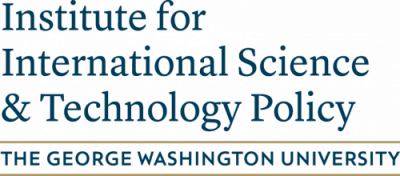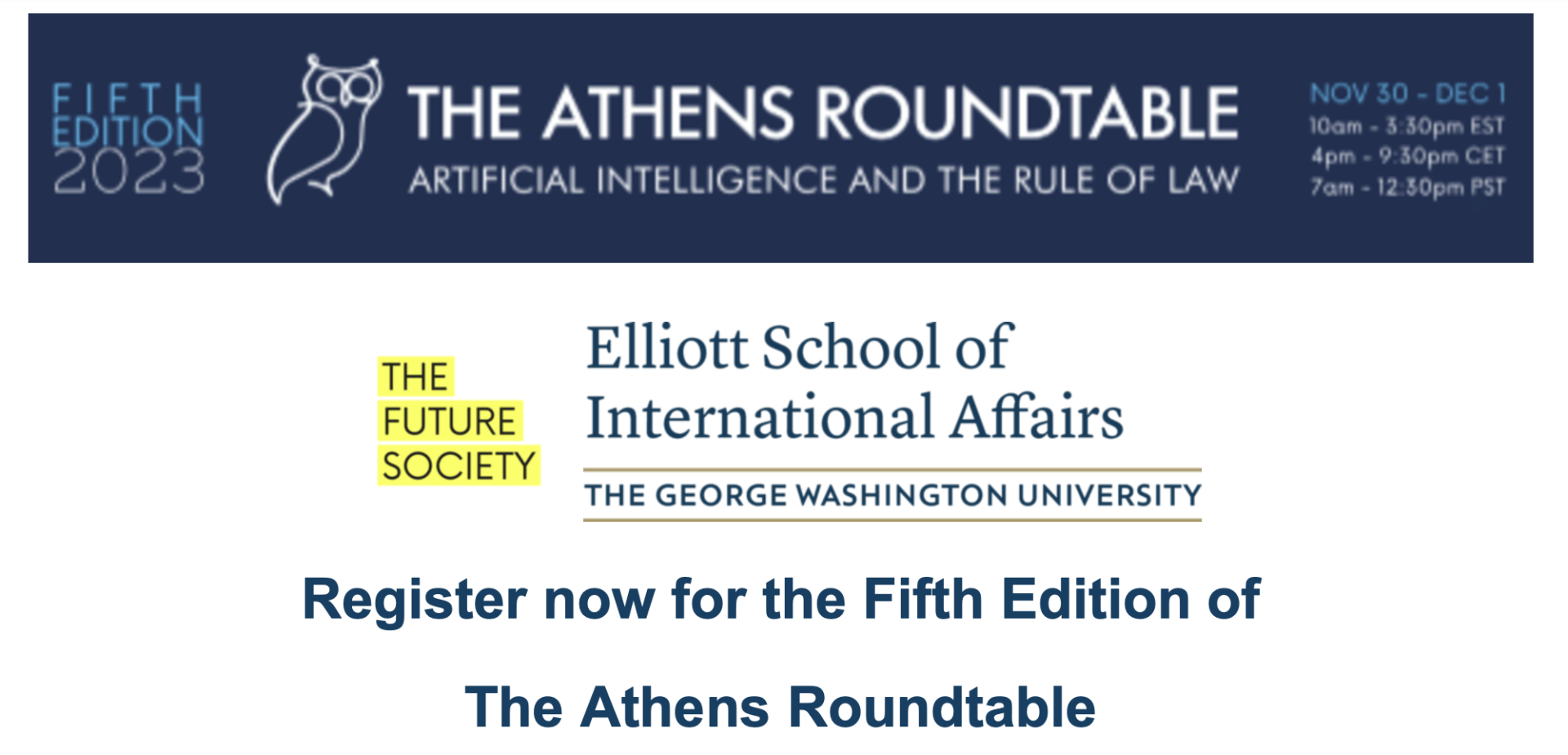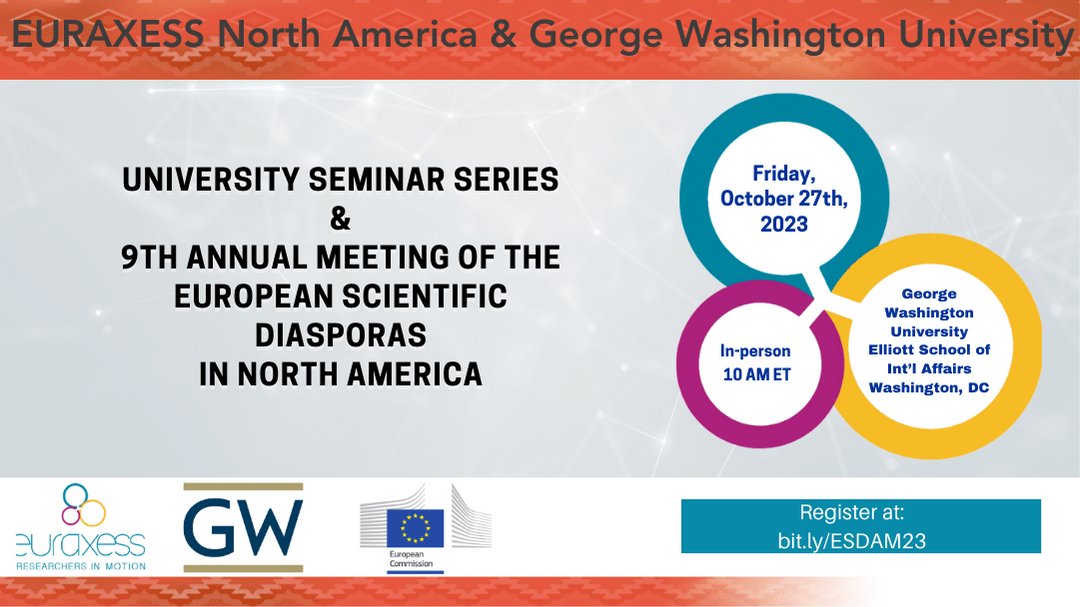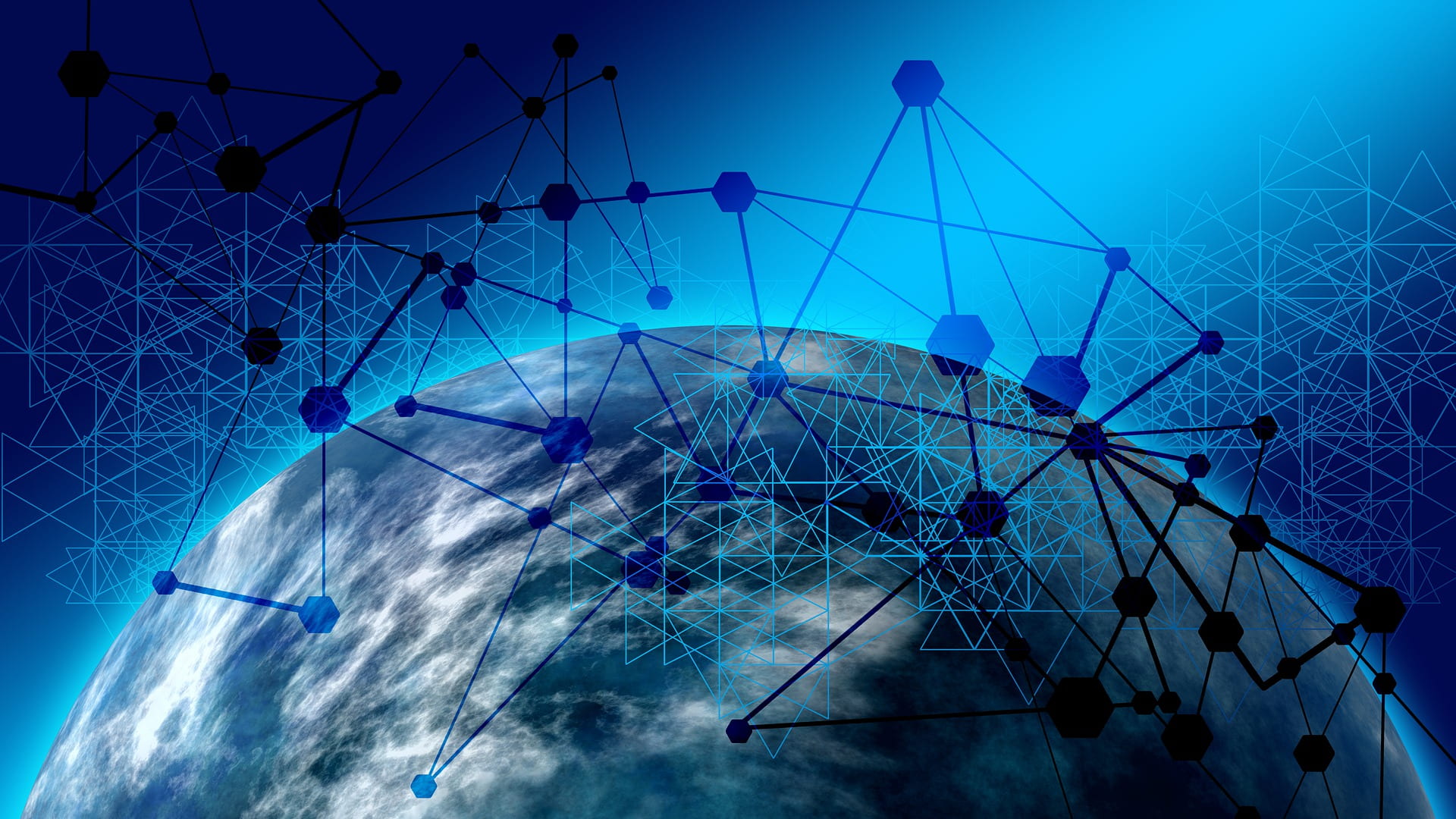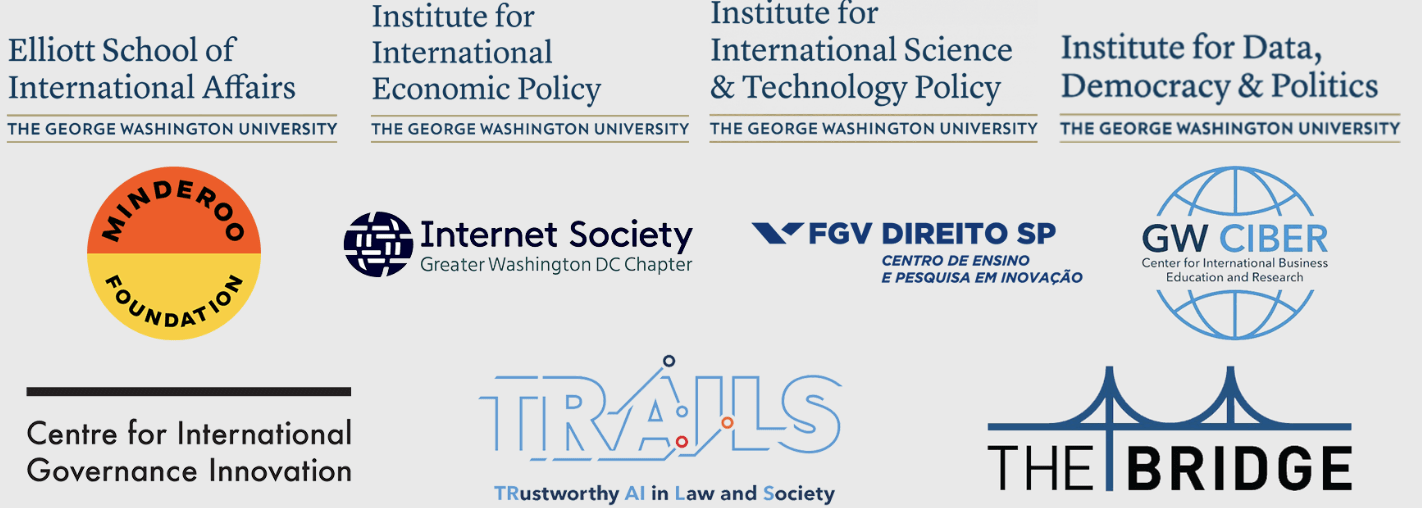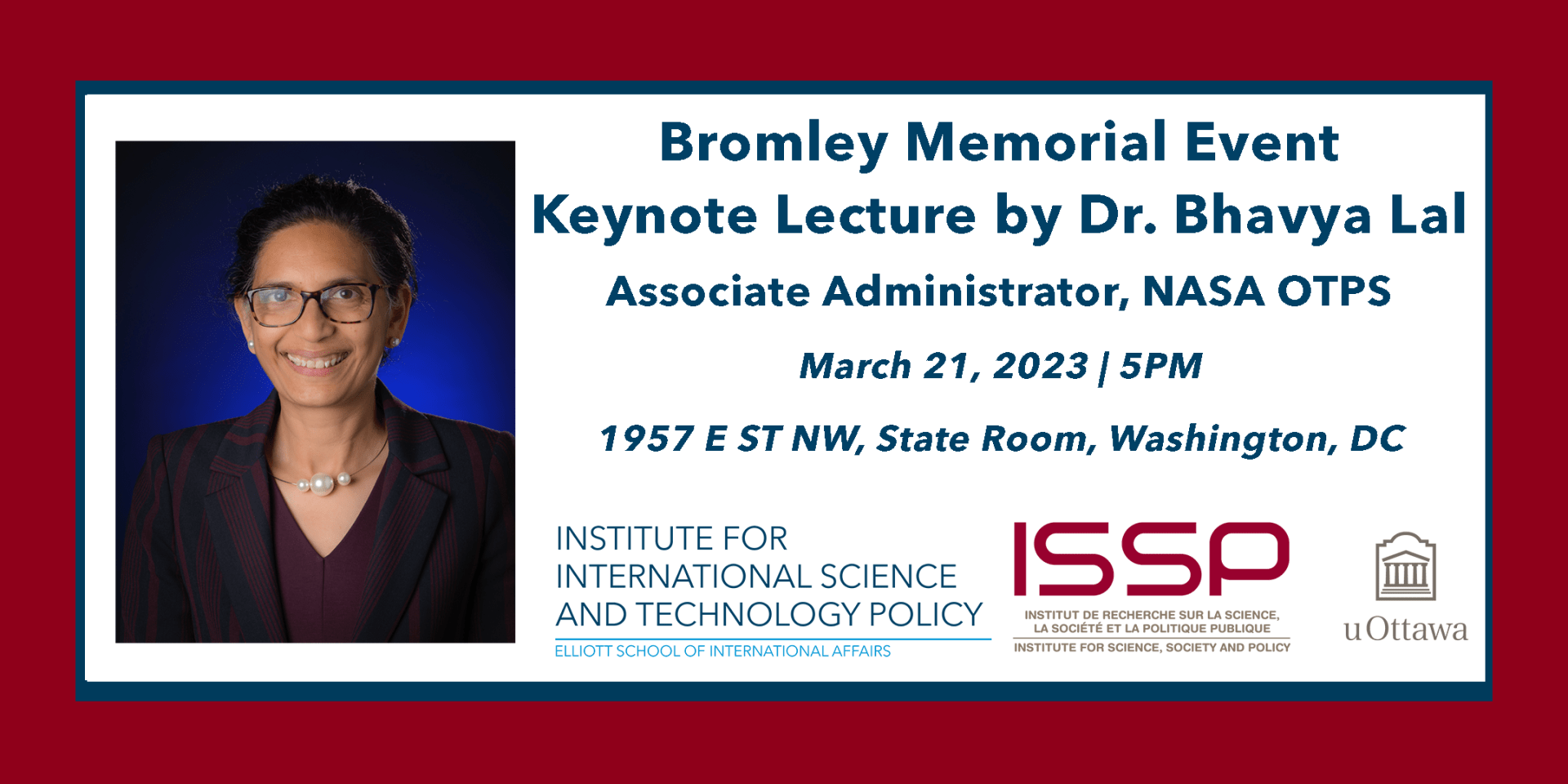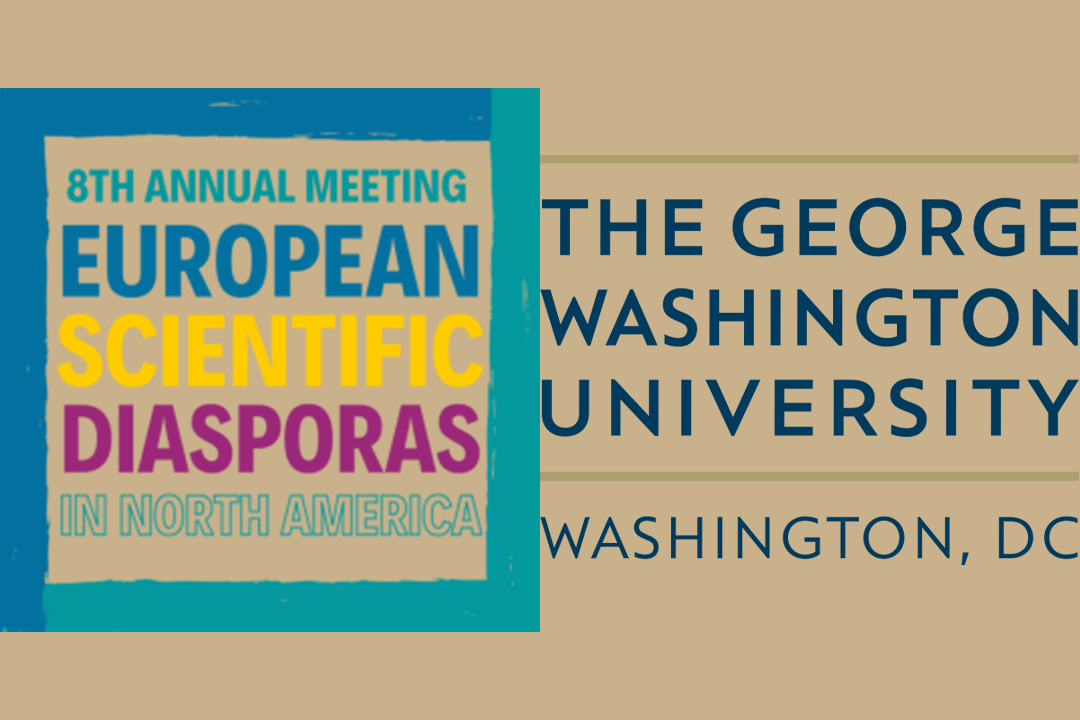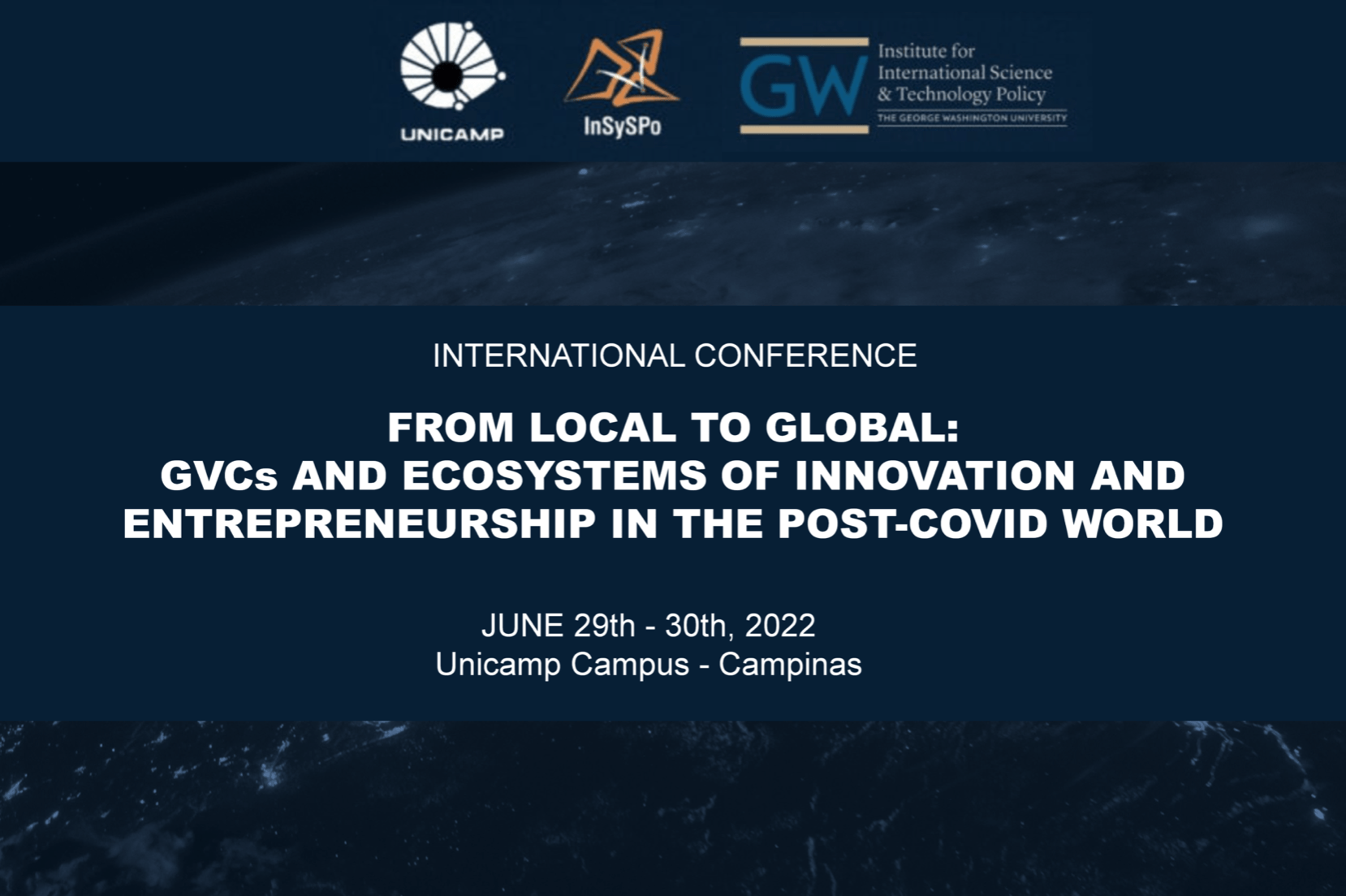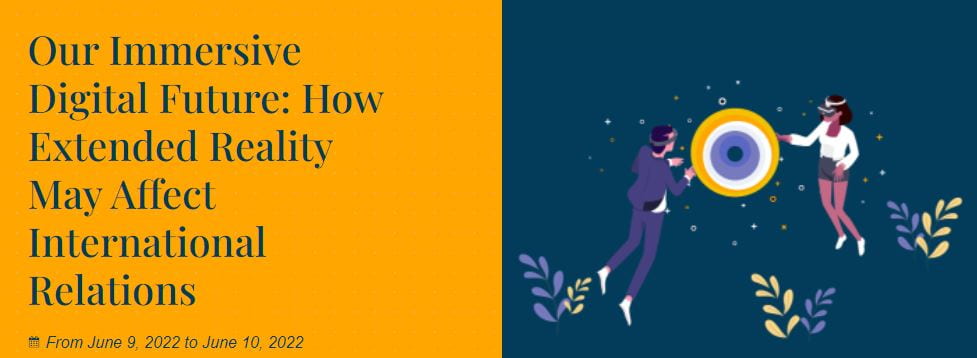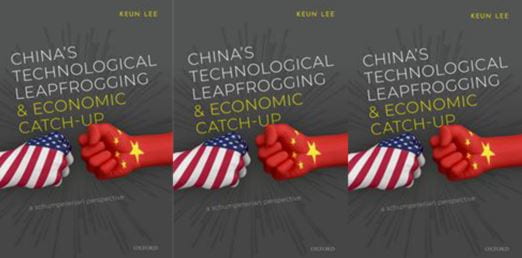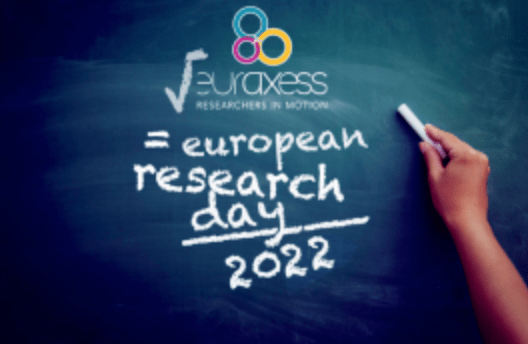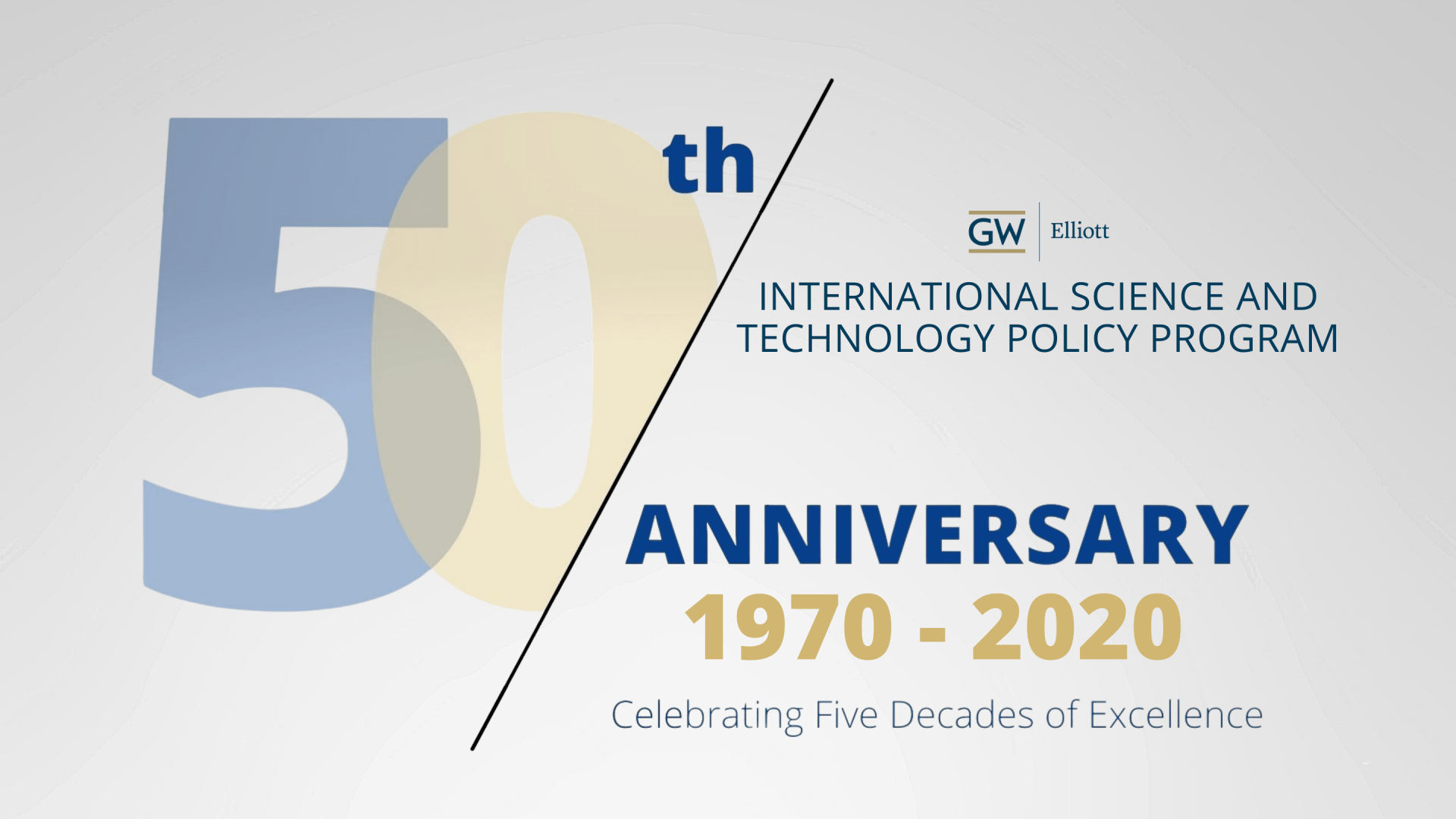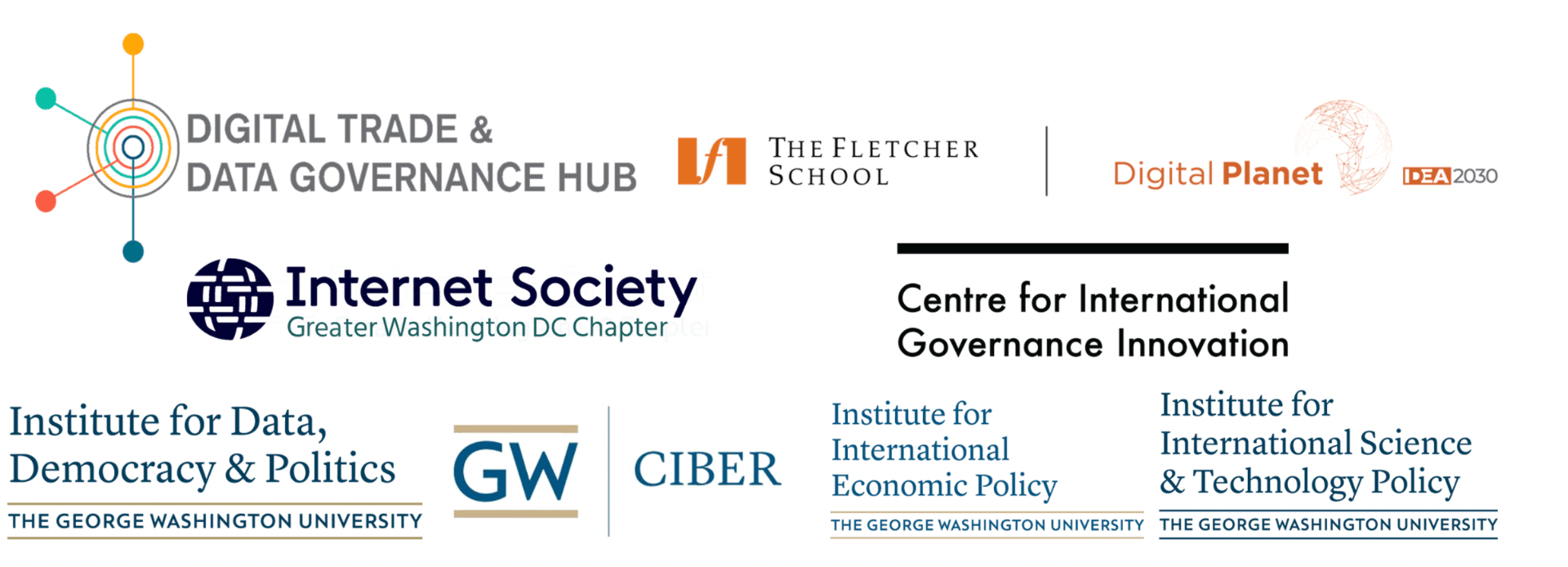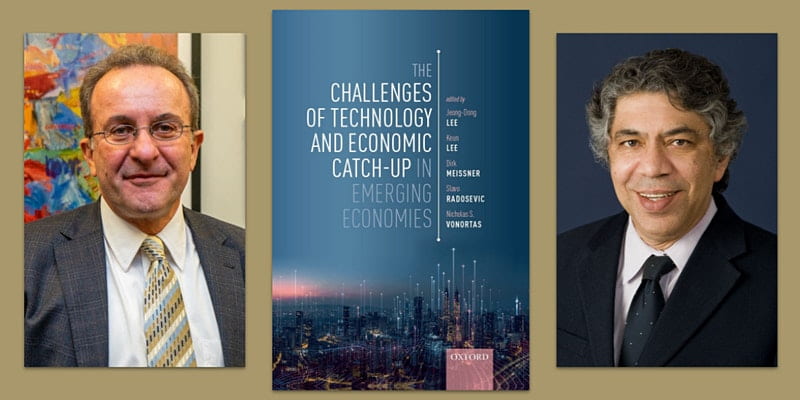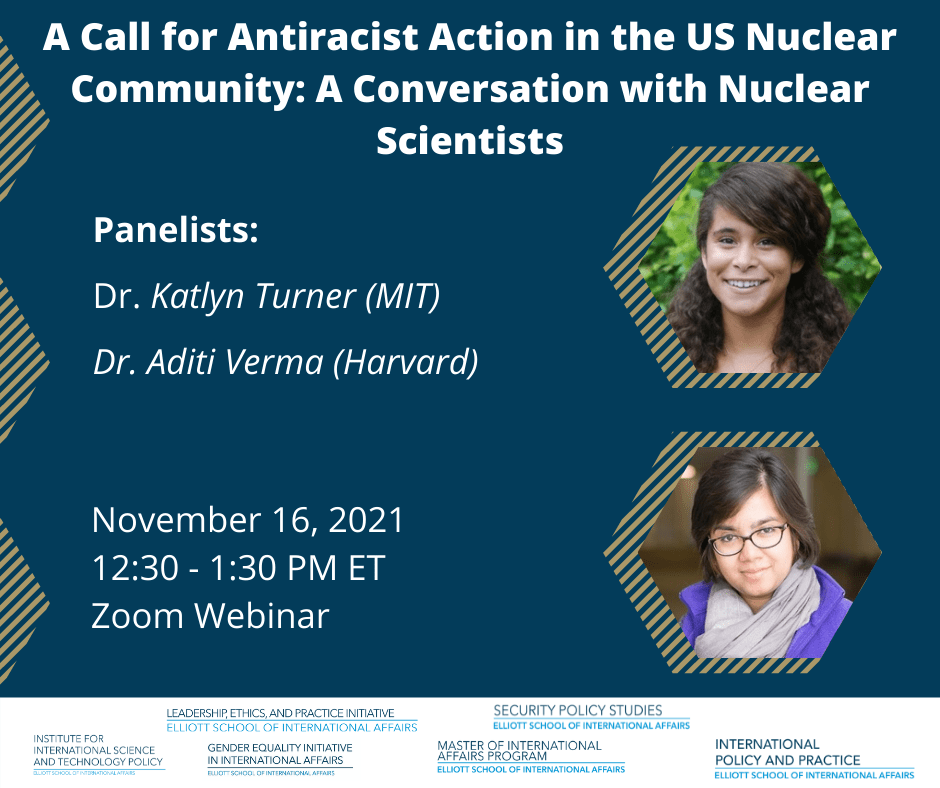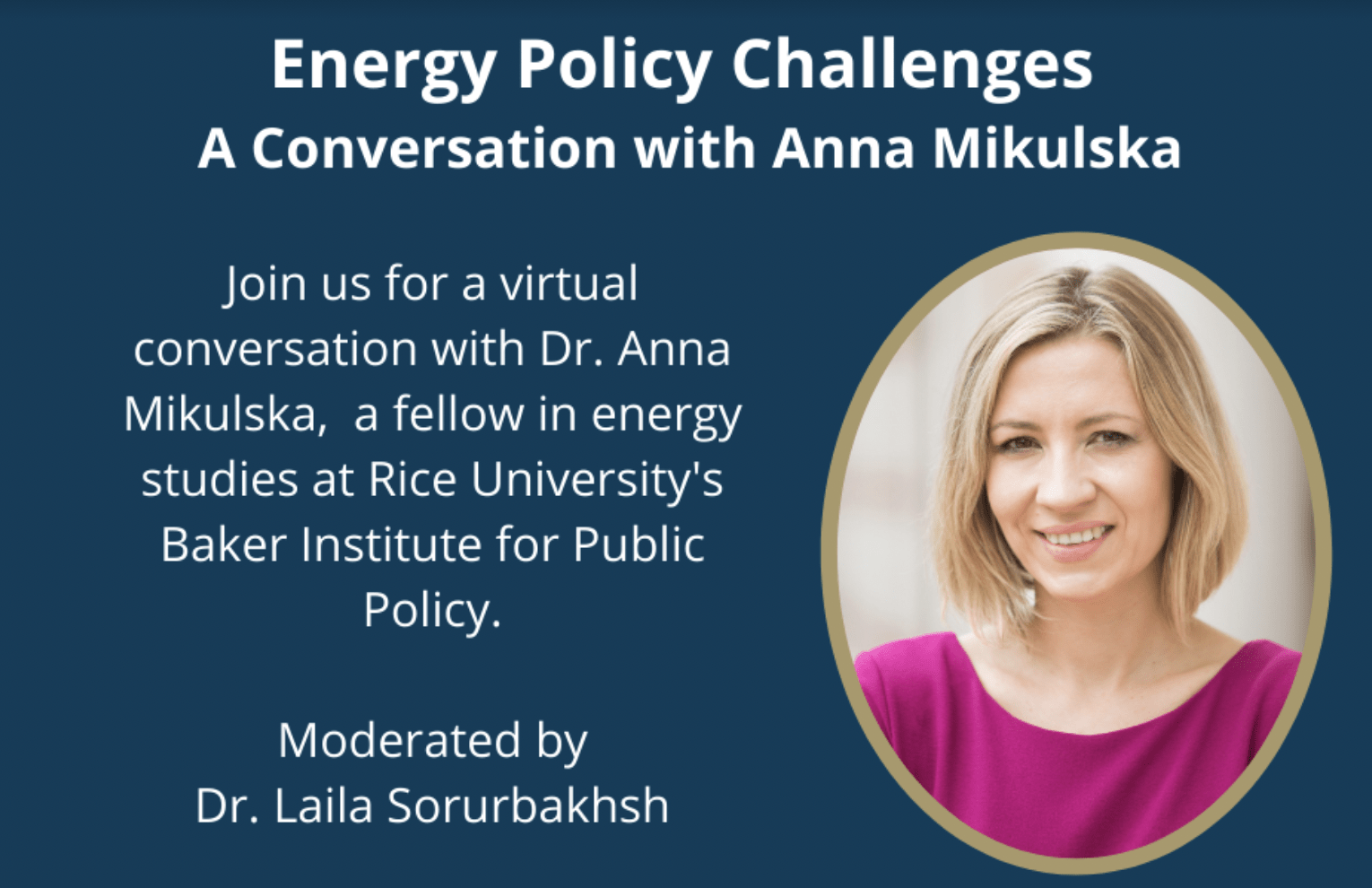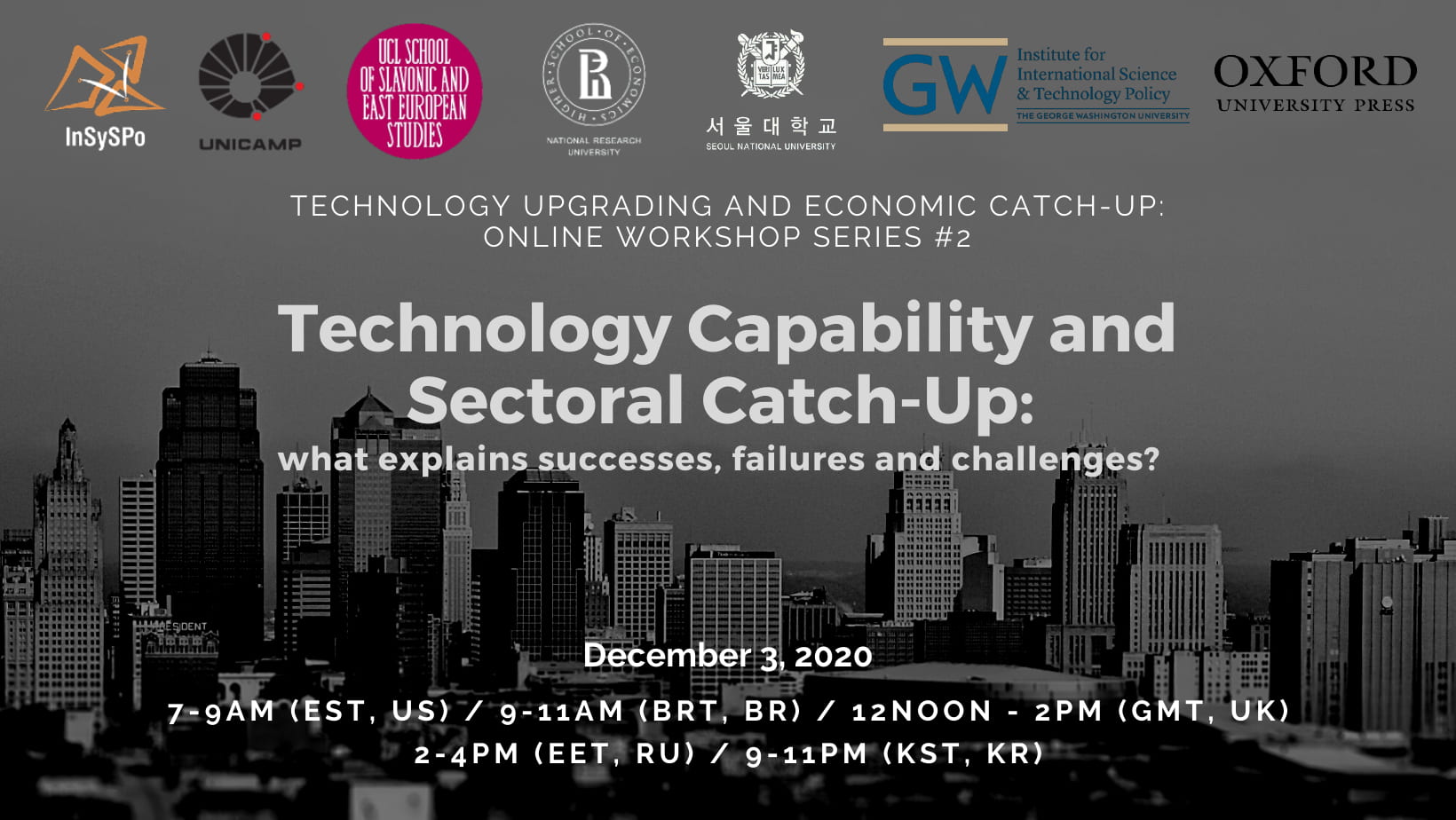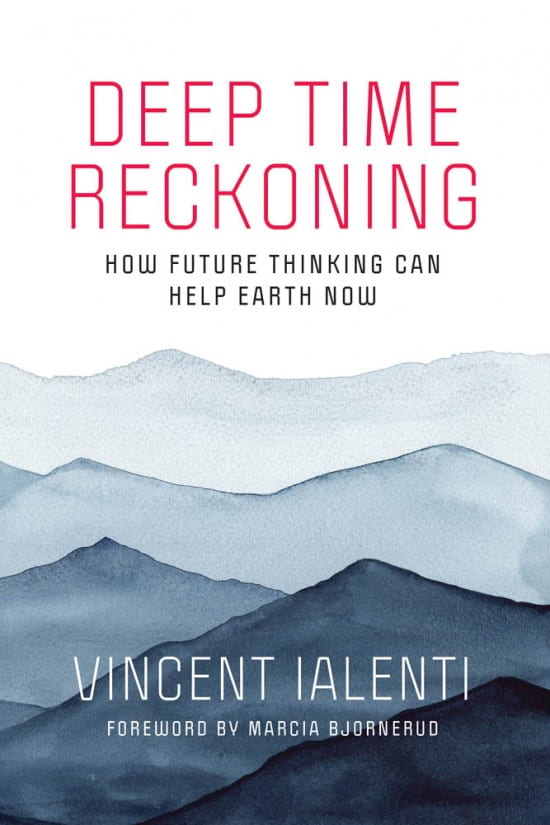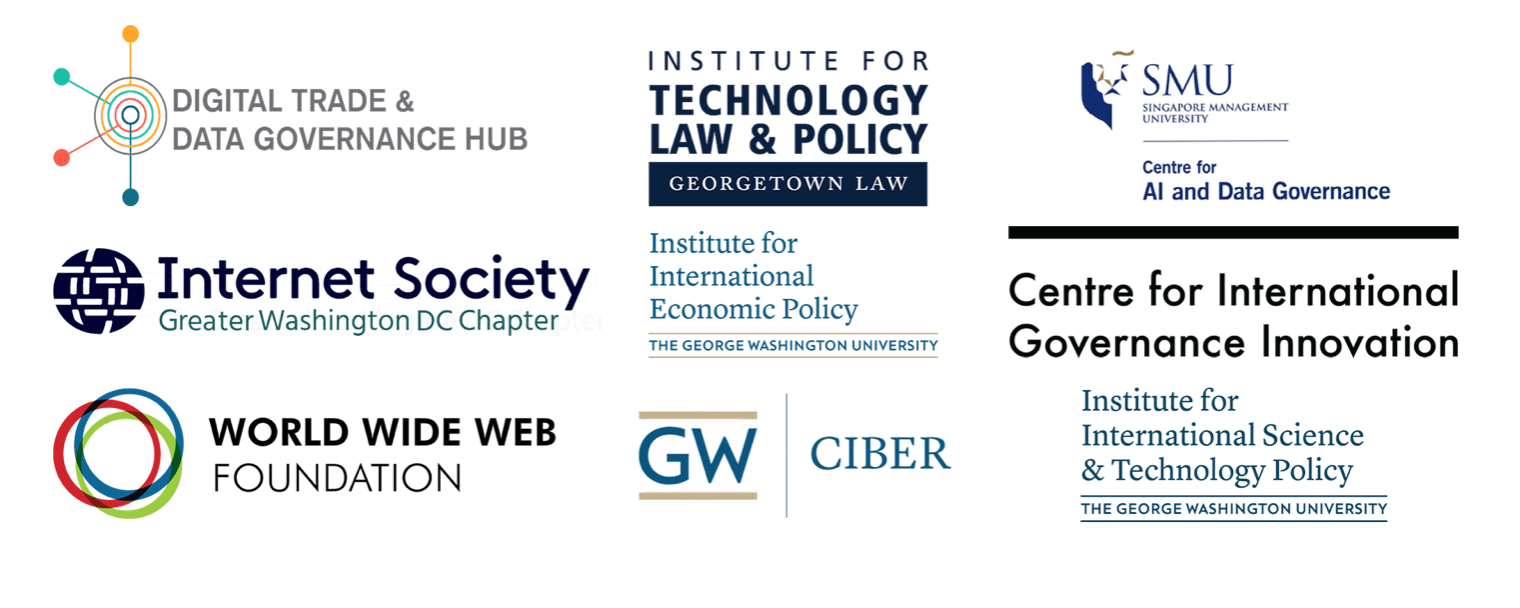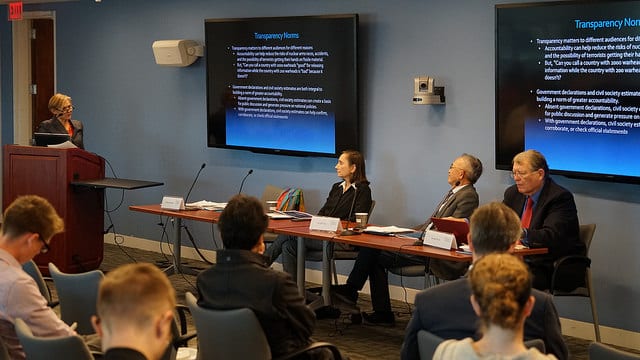IISTP hosts events throughout the year. Signature event series include our Nuclear Policy Talks (NPT) and IISTP Seminars. In addition, the Institute hosts several special events during the year including the GW Boot Camp on Nuclear Security Policy. Most of our NPT talks and IISTP Seminars are open to the public and press (at the discretion of the speaker).
Upcoming & Recent Events

Times
EST | 10am – 3:30pm
CET | 4pm – 9:30pm
PST | 7am – 12:30pm

Format
Online | Zoom Events
In-person | Jack Morton Auditorium
(805 21st St NW, Washington, D.C.)
- Discuss a comprehensive approach to the governance of generative AI and foundation models, encompassing safety assessments, security measures, and regulatory strategies from development to deployment.
- Examine how international coordination and institutional innovation can address geopolitical and market pressures in AI governance while upholding fundamental rights.
Teaming Up: Leveraging Networks towards a Stronger Global Approach to Research and Innovation Science.
This is the third activity of the GWU Seminar Series on Science Diplomacy and the Ninth Annual Meeting of the European Scientific Diasporas in North America
Friday, October 27, 2023 | 10:00AM EDT
Nuclear Ethics
Wednesday, October 18, 2023
12:30-2:00 p.m.
Room 505 (Elliott School of International Affairs)
Light refreshments will be served. This event is on the record and open to the press.
Join the Institute for International Science and Technology Policy for a discussion with Stanford University Professor Scott Sagan and Nuclear Threat Initiative President Joan Rohlfing.
The Institute for International Science and Technology Policy is pleased to host a discussion with two nuclear experts on the topic of “Nuclear Ethics.” Scott Sagan and Joan Rohlfing authored articles published in the Spring 2023 issue of Ethics & International Affairs, revisiting the topic of Harvard Professor Joe Nye’s 1986 book, Nuclear Ethics. “Just and Unjust Nuclear Deterrence” by Sagan and “The Myth of ‘Just’ Nuclear Deterrence: Time for a New Strategy to Protect Humanity from Existential Nuclear Risk” by Rohlfing can be found here.
Speakers
Scott D. Sagan is Co-Director and Senior Fellow at the Center for International Security and Cooperation, the Caroline S.G. Munro Professor of Political Science, and the Mimi and Peter Haas University Fellow in Undergraduate Education. He also serves as Chairman of the American Academy of Arts and Sciences’ Committee on International Security Studies. Before joining the Stanford faculty, Sagan was a lecturer in the Department of Government at Harvard University and served as special assistant to the director of the Organization of the Joint Chiefs of Staff in the Pentagon.
Sagan is the author of Moving Targets: Nuclear Strategy and National Security (Princeton University Press, 1989); The Limits of Safety: Organizations, Accidents, and Nuclear Weapons (Princeton University Press, 1993); and, with co-author Kenneth N. Waltz, The Spread of Nuclear Weapons: An Enduring Debate (W.W. Norton, 2012). He is the co-editor of Learning from a Disaster: Improving Nuclear Safety and Security after Fukushima (Stanford University Press, 2016) with Edward D. Blandford; co-editor of Insider Threats (Cornell University Press, 2017) with Matthew Bunn; and co-editor of The Fragile Balance of Terror (Cornell University Press, 2022) with Vipin Narang. Sagan was also the guest editor of a two-volume special issue of Daedalus: Ethics, Technology, and War(Fall 2016) and The Changing Rules of War (Winter 2017).
In 2022 Sagan received the Thérèse Delpech Memorial Award from the Carnegie Endowment for International Peace, an award given for “exceptional service to the nongovernmental nuclear policy community.” He received the 2018 Andrew Carnegie Fellowship from the Carnegie Corporation of New York. In 2017, he received the International Studies Association’s Susan Strange Award which recognizes the scholar whose “singular intellect, assertiveness, and insight most challenge conventional wisdom and intellectual and organizational complacency” in the international studies community. Sagan was also the recipient of the National Academy of Sciences William and Katherine Estes Award in 2015, for his work addressing the risks of nuclear weapons and the causes of nuclear proliferation. The award, which is granted triennially, recognizes “research in any field of cognitive or behavioral science that advances understanding of issues relating to the risk of nuclear war.” In 2013, Sagan received the International Studies Association’s International Security Studies Section Distinguished Scholar Award. He has also won four teaching awards: Stanford’s 1998-99 Dean’s Award for Distinguished Teaching; Stanford’s 1996 Hoagland Prize for Undergraduate Teaching; the International Studies Association’s 2008 Innovative Teaching Award; and the Monterey Institute for International Studies’ Nonproliferation Education Award in 2009.
Joan Rohlfing is president and chief operating officer of the Nuclear Threat Initiative (NTI). She provides overall leadership and guidance on NTI’s strategic priorities and direction, catalyzes new project activities and innovation work streams and is responsible for managing NTI’s day-to-day operations.
Rohlfing became president and chief operating officer of NTI in January 2010, after nine years as NTI’s senior vice president for programs and operations. She is responsible for managing all NTI programs and operations.
She was part of the original team that created the mission and scope for NTI in 2000. Once the organization launched in 2001, she played strategic roles in several of NTI’s hallmark projects such as the formation of the World Institute for Nuclear Security, the creation of the Middle East Consortium on Infectious Disease Surveillance and the Nuclear Security Project led by former Secretary of State George P. Shultz, former Secretary of Defense William J. Perry, former Secretary of State Henry A. Kissinger and former Senator Sam Nunn in their effort to galvanize global action to reduce urgent nuclear dangers and build support for reducing reliance on nuclear weapons, ultimately ending them as a threat to the world.
Before joining NTI, she held senior positions with the U.S. Department of Energy during the Clinton Administration, as senior advisor for national security to the Secretary of Energy and as director of the Office of Nonproliferation and National Security. In 1999-2000, after the nuclear tests in India and Pakistan, Rohlfing served at the U.S. Embassy in New Delhi, India where she advised the ambassador on nuclear security issues. Earlier, she served as a professional staff member of the U.S. House Armed Services Committee. Rohlfing began her career in the Office of the Secretary of Defense, where she was awarded a Presidential Management Internship and later worked in the office of Strategic Forces Policy.
Rohlfing holds a master’s degree from the University of Maryland and a bachelor’s degree from the University of Illinois. She was awarded the Department of Defense Civilian Service Medal in 1989. In 2011, the University of Maryland School of Public Policy gave her the Distinguished Alumnus of the Year Award, citing her career in public service.
Rohlfing is a Gender Champion in Nuclear Policy and a member of the Council on Foreign Relations.
Douglas Shaw (Moderator) is a Senior Advisor at the Nuclear Threat Initiative and a Research Professor of International Affairs at the George Washington University’s Elliott School of International Affairs.
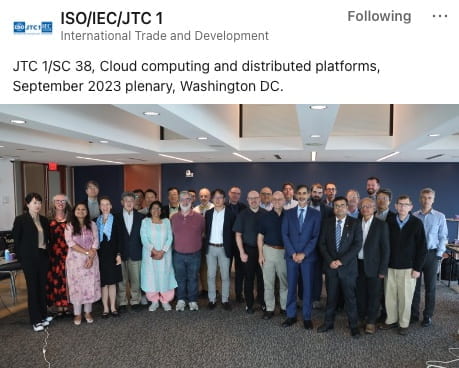
IISTP HOSTED SC 38 PLENARY
September 18-22, 2023
Discuss and consider cloud commuting standards
Elliott School meeting rooms
The hosting of the SC 38 Plenary is normal in the long history of IISTP supporting science and technology. The SC 38, as part of the ISO-IEC/JTC 1 organization represents the highest level of commitment by scientists and engineers to advance science and technology standards through democratic norms, voting on approval or rejection for each standard. Throughout the world in a mesh of representatives from around the globe, the ISO-IEC/JCT gives voice to the technical concerns, solutions, and standards for our modern high-technological age.
From September 18-22, 2023, IISTP hosted the ISO-IEC/JTC 1, SC 38 Cloud Computing and Distribution Platforms Plenary in meeting rooms in the Elliott School. This SC 38 Plenary included 35-40 national body delegates from across the world. The meetings of working groups 3 and 4, 1 and 5 discussed and considered the below standards and topics. The SC 38 expressed a grand gratitude for the warm welcome and assistance with the facilities of the Elliott School.
New Item Highlights:
• Cloud and Edge Networking
• Dataspaces, concepts and characteristics
• Cloud service customer business continuity and resilience
• Trustworthiness in cloud computing
Amendments and revisions of standards by SC 38:
• Revision to 19941-1 Interoperability and portability
• WG 3 creation of an ad-hoc group for alignment of 22123 series (Vocabulary, terminology, and reference architecture)
• Creation of an ad-hoc to provide comments on DTS 38508 – Governance implications of shared digital service platform among ecosystem organizations
Comparing AI Regulatory Models: A Discussion With Professor Anu Bradford
Wednesday, August, 9, 2023 | 11AM-12PM EDT | Online
Despite their desire to nurture various forms of AI, many of the world’s policymakers are ready to regulate AI risks as well as business practices. On August 9, at 11:00 am EDT, the Hub will host a discussion of Anu Bradford’s new book Digital Empires: The Global Battle to Regulate Technology. Professor Bradford examines three competing regulatory approaches—the American market-driven model, the Chinese state-driven model, and the European rights-driven regulatory mode. She also explores how governments and tech companies navigate the inevitable conflicts that arise when these regulatory approaches collide in the international domain. Professor Bradford will speak for 15 minutes, Dr. Patrick LeBlond from the Graduate School of Public and International Affairs, University of Ottawa will provide ten minutes of comments, and then we open the floor to your questions.
Please register to receive you link to join the webinar.
Webinar: Let’s Make Virtual Worlds More Livable – Ideas to Prevent Metaverse Harms
Thursday, July 20th, 2023 | 12PM-1PM EDT
Register to receive your link to join the event.
The metaverse does not exist, yet policymakers in the EU and South Korea, for example, have drafted strategies, made significant investments, and already debated potential rules. However, the technologies, platforms, and tools to make these virtual worlds are already in wide use. In this webinar, Shannon Pierson of the Minderoo Centre for Technology and Democracy, Cambridge University, will present her report on potential harms in the metaverse and how they can be addressed. Pierson focuses on the key technology –extended reality (XR) examining related issues of governance, human rights, and cybersecurity. Dr. Louis Rosenberg, XR pioneer and CEO of Unanimous AI, will comment on the paper and then, as always, we will open it up for audience questions.
Science and Technology Diplomacy in the Context of the United States’ New Techno-Industrial Strategy
May 31, 2023 | 10:00AM-12:00PM EDT
This discussion is the second event in the GW Seminar Series on Science Diplomacy.
The event recording is now available.
About the Event
12:00PM: Welcome Remarks, Profess Aaron Bateman, Space Policy Institute, George Washington University
12:05PM: Keynote Speech, Seth Center, Deputy Special Envoy for Critical and Emerging Technology, US Department of State
12:30PM: Panel Discussion
- Jason Donovan, OES/STC Director, US Department of State
- Florent Bernard, Science Counselor, EU Delegation in Washington, DC
- Koji Aribayashi, S&T Counselor, Embassy of Japan in Washington, DC
- Kim Montgomery, Director of International Affairs and Science Diplomacy, AAAS
- Moderated by Scott Pace, Director Institute for International Science and Technology Policy and Space Policy Institute, George Washington University
This hybrid event is open to the media and the public and it will be recorded. Feel free to join us in-person at the Elliott School of International Affairs or online via Zoom.
Light breakfast will be provided.
Congressman Don Beyer Chats with Computer Scientist Hal Daumé III
Friday, May 12, 12:00-1:00 PM EDT
Like many Americans, members of Congress are struggling to understand the costs and benefits as well as the workings of various forms of AI. But Congressman Don Beyer is not your average member. Like other members, he serves on several committees, including the Joint Economic Committee and the House Committee on Ways and Means. However, Beyer also enrolled as a student in artificial intelligence at George Mason University because he is fascinated by AI and wants to apply his understanding to legislation. In this webinar, Hub friend Professor Hal Daumé will ask the Congressman about his coursework, how his understanding of AI can help other members keep up with the technology, and whether and how Congress should regulate high-risk AI.
Speaker:
– Congressman Don Beyer, 8th District, Virginia.
Moderator:
– Professor Hal Daumé III, Volpi-Cupal Family Endowed Professor in Computer Science, University of Maryland, and co-author of Language (Technology) is Power
Space and Cybersecurity
April 25, 2023 | 1PM EDT
Elliott School of International Affairs, Room 505
The event recording is now available.
The Space Policy Institute and Institue for International Science and Technology Policy are pleased to present a panel discussion focusing on the nexus of space and cybersecurity.
AGENDA
1:00PM: Keynote Remarks
- Scott Pace, Director, Space Policy Institute, George Washington University
1:10PM: Panel Discussion
- Gil Baram, Affiliate of Stanford University’s Center for International Security and Cooperation
- Melissa Griffith, Senior Lecturer in Technology and National Security at Johns Hopkins University
- Neil Sherwin-Peddie, Head of Space Security and Enterprise Security at BAE Systems Digital Intelligence, former Deputy Head of Information Assurance at the U.K. Foreign Office
- Moderated by Aaron Bateman, Assistant Professor, Space Policy Institute, George Washington University
This will be a hybrid event. You’re welcome to join us in-person at 1957 E ST NW or online via Zoom. Please register to receive more information on how to access the event. The event is open to the public and media and it will be recorded.
Bromley Memorial Keynote Lecture
Tuesday, March 21, 2023 | 5PM | 1957 E ST NW, State Room (7th Floor), Washington, DC 20052
The event recording is now available.
About the Event
The Institute for International Science and Technology Policy (IISTP) at GW’s Elliott School and uOttawa’s Institute for Science, Society, and Policy (ISSP) are pleased to host the 2023 Bromley Memorial Keynote Lecture, featuring Dr. Bhavya Lal, Associate Administrator, NASA OTPS. Dr. Lal will lend her extensive experience and expertise to the subject of international and other policy challenges and opportunities that need to be addressed as we endeavor to go to the Moon and then Mars. Her remarks will be followed by brief remarks from two student responders and the event will finish with an audience Q&A.
About the Speaker
Dr. Bhavya Lal is the associate administrator for the NASA Office of Technology, Policy, and Strategy (OTPS) within the office of the NASA administrator. She provides executive leadership, direction, and evidence-driven advice to NASA leadership on internal and external policy issues, strategic planning, and technology investments. Lal also previously served as the acting chief technologist of NASA and was the first woman to hold the position in over 60 years of NASA history. Before her current role and in the first 100 days of the Biden Administration, she was the acting chief of staff at NASA, directing the agency’s transition under the administration of President Biden.
Lal has over 20 years of experience as an active part of the space technology and policy community, having worked for government sponsors, federal departments, and agencies, and chaired, co-chaired, or served on multiple committees. She has more than 50 papers published in peer-reviewed journals and conference proceedings.
Lal received her bachelor’s and master’s degrees in nuclear engineering from the Massachusetts Institute of Technology (MIT) and a second master’s from MIT’s Technology and Policy Program. She earned her doctorate in Public Policy and Public Administration from George Washington University.
About Accessing the Event
This event will take place on March 21, 2023 at 5PM in the State Room at 1957 E ST NW, Washington, DC 20052. It will also be available online, via Zoom. The discussion will be on the record and recorded. Please register for additional information.
About the Bromley Memorial Event
One of the world’s leading nuclear physicists, D. Allan Bromley was born in Westmeath, Ontario, in 1926 and held degrees from Queen’s University and the University of Rochester. Dr. Bromley sat on President Regan’s White House Science Council and was the first person to hold the Cabinet-level rank of Assistant to the President for Science and Technology from 1989 to 1993, a position he held during the administration of George H.W. Bush. D. Allan Bromley died in 2005. To learn more about the life and work of Dr. Bromley, read Dr. Paul Dufour’s reflections on Allan Bromley’s efforts in strengthening the Canada-US STI policy partnership during his tenure as OSTP Director and at Yale.
Founded by Dr. John de la Mothe, a Canada Research Chair and Professor at the University of Ottawa, the annual Bromley Memorial Event is now organized by the University of Ottawa ISSP and the George Washington University IISTP. The two day event provides graduate students from GW and uOttawa with the opportunity to meet and exchange ideas with senior science and technology (S&T) policy advisors from various countries, sectors, and levels of government in Washington D.C. and in Ottawa.
The keystone of the event is the public Bromley Memorial Keynote lecture. Previous keynote speakers have included: Dr. Mona Nemer, Chief Science Advisor of Canada; Dr. Sethuraman Panchanathan, Director of the National Science Foundation; and many more distinguished S&T policy leaders.
Nuclear Security: Our View from Vienna with Ambassador Laura Holgate
March 17 | 1PM | 1957 E ST NW, Lindner Commons (Room 602, 6th Floor), Washington, DC
GW’s Institute for International Science and Technology Policy is honored to welcome Ambassador to the Vienna Office of the United Nations and the International Atomic Energy Agency, Laura Holgate. Ambassador Holgate will offer brief remarks, focusing on nuclear security, before opening the discussion to Q&A.
Dean of the Elliott School of International Affairs, Alyssa Ayres, will give welcoming remarks and Research Professor Doug Shaw will moderate the Q&A.
This will be an in-person event following Chatham House Rule.
About the Speaker
Laura S.H. Holgate serves as U.S. Ambassador to the Vienna Office of the United Nations and to the International Atomic Energy Agency, advancing multilateral approaches to reduce global threats and seize opportunities in the areas of nuclear nonproliferation, nuclear security, verification of the Iran nuclear deal, nuclear energy, nuclear testing, counterterrorism, anti-corruption, drug policy, cybercrime, and export control. She previously held the position from July 2016 to January 2017.
From 2018 to 2021, Ambassador Holgate was vice president for materials risk management at the Nuclear Threat Initiative (NTI), responsible for designing and executing NTI’s activities to prevent nuclear terrorism, such as reducing quantities and enhancing security of nuclear and radiological materials around the world, promoting cooperation between the United States and key partners on nuclear and radiological security, and strengthening the global nuclear security architecture.
Ambassador Holgate co-led the creation of Gender Champions in Nuclear Policy, launched in November 2018, to increase the presence, visibility and impact of women in nonproliferation, nuclear deterrence, nuclear security, disarmament, nuclear energy and related areas. During her previous ambassadorial posting, she promoted gender balance in the staff and programming of the Vienna-based international organizations, laying the groundwork for the creation of the Vienna chapter of the International Gender Champions, and is proud to have joined this chapter in March 2022.
Ambassador Holgate served as the special assistant to the president and senior director for weapons of mass destruction terrorism and threat reduction on the U.S. National Security Council from 2009 to 2016. In this role, she oversaw and coordinated the development of national policies and programs to reduce global threats from nuclear, biological and chemical weapons; detect, identify, secure and eliminate nuclear materials; prevent malicious use of biotechnology; and secure the civilian nuclear fuel cycle. She was the U.S. Sherpa to the Nuclear Security Summits and co-led the effort to advance the President’s Global Health Security Agenda.
Holgate was a founding Vice President of NTI, leading its Russia/New Independent States programs from 2001 to 2009. Prior to that, she directed the U.S. Department of Energy’s Office of Fissile Materials Disposition from 1998 to 2001, and was special coordinator for cooperative threat reduction at the Department for Defense from 1995 through 1998, where she provided policy oversight of the “Nunn-Lugar” Cooperative Threat Reduction program.
Holgate received a Bachelor of Arts Degree in politics from Princeton University and a Master of Science Degree in political science from the Massachusetts Institute of Technology, and spent two years on the research staff at Harvard University’s Belfer Center for Science and International Affairs at the Kennedy School of Government. Holgate is a member of the Council on Foreign Relations.
Webinar:
The State of AI in China with Dr. Jeffrey Ding
Friday, March 10, 11:00-12:00 PM EST
The event recording is now available.
Market dominance in AI should not be a competition among nations. However, in recent years, some analysts have sounded an alarm– asserting that China, an authoritarian regime, could achieve comparative advantage in AI due to several factors including its large supply of government capital, excellent infrastructure; large supply of well-trained engineers, data, and computer scientists; huge troves of data; and its AI and data governance paradigm.
But recent developments challenge that hypothesis. First, the government has bullied tech managers and investors and altered its approach to regulation. The COVID lockdown has altered investment patterns and US policies have disincentivized shared research and corporate partnership. Finally, Western companies have created widely utilized large visual and language learning models such as DALL-E and ChatGPT. These models have been described as the next platform shift, because they can be easily deployed across existing technologies.
Taken in sum, these developments could have wide ranging impacts on global economic and political relations. Our speaker, Jeffry Ding will provide insights into the state of AI in China, as well as its governance.Speaker:
- Dr. Jeffrey Ding, Assistant Professor, GWU
Moderator, Dr. Susan Ariel Aaronson, Director, Digital Trade and Data Governance Hub, Research Professor and Cross-Disciplinary Fellow, GWU
US-Japan Nuclear Energy Cooperation in Fast Reactors
Friday, March 10 | 6:00PM-8:00PM EST | Online via Zoom
The webinar recording is now available in English and in Japanese.
The U.S. and Japanese public and private sectors are currently cooperating on advanced reactors, also known as “fast reactors.” Both countries pursued the commercialization of fast reactors beginning in the 1950s but halted their programs for different reasons and at different times. The United States halted construction of prototype reactors in the 1990s due to soaring costs, safety issues, and the risks of nuclear proliferation. Japan abandoned its prototype Monju reactor in 2016 for cost and safety issues.
The United States and Japan are now returning to this technology together. The US Department of Energy is financially supporting the construction of demonstration reactors by the private sector and Japan has decided to join the US program.
The cooperation raises interesting questions. Is there any prospect for commercialization of fast reactors in the near future? What are the hoped-for gains? Are fast reactors an effective solution to nuclear waste and climate change? What are the potential nuclear proliferation implications? This event features speakers from the United States, Canada and Japan to discuss the current status, feasibility and implications of promoting the development of fast reactors.
MODERATORS
Sharon Squassoni (Professor, the George Washington University)
Sayo Saruta (President, New Diplomacy Initiative)
SPEAKERS & TOPICS
Frank von Hippel(Professor emeritus, Princeton University)
EURAXESS North America and George Washington University (GWU) are co-hosting the Eighth Annual Meeting of the European Scientific Diasporas in North America. This flagship event will be the first activity of the GWU Seminar Series.
Thursday, December 1, 2022 | 10:00AM EST
The event explores the successes and experiences of the European researcher diaspora networks in the United States and Canada and the increasing importance of scientific diasporas. This will be a hybrid event. Guests are welcome to join us in-person at 1957 E ST NW, Lindner Commons (Room 602), Washington, DC 20052 or online via Zoom. Please register for more information on how to access the event online.
This year’s theme is Scientific Diasporas in Science Diplomacy. The free event is open to all researchers in North America, including European researchers as well as current, previous, and potential researchers based in Canada and the U.S. who have or would like to benefit from European research grants to further their careers. Representatives from scientific diaspora networks, European embassies, North American universities, U.S. government, industry, research institutions, and more are also welcome to attend and participate.
The event recording is now available!
XR, AI, & Human Rights
A DataGovHub Webinar | Tuesday, November 1, 2022 12:00PM-1:00PM EDT
View the event recording.
Data-driven technologies such as XR and AI could, if effectively designed and deployed, enhance human rights because they expand individual capabilities. XR uses computer-generated virtual environments to enhance an individual’s capabilities and experiences. AI, in contrast, attempts to replicate the way humans understand and process information and, combined with the capabilities of a computer, process vast amounts of data without flaws. But computers lack moral and ethical reasoning skills although some people assert that computers can be trained with the “right” data. Yet many believe these technologies undermine a wide range of human rights from access to information, privacy, freedom of speech and association, and rights to non-discrimination, for example.
Speaker:
Dr. Louis Rosenberg, a pioneer of virtual and augmented reality for over 30 years and current CEO of Unanimous AI. He has written a variety of pieces arguing that several human rights will be undermined and we will be subject to more fraud and deception.
Moderator: Research Professor Susan Aaronson, Director of the Digital Trade and Data Governance Hub, GWU.
You can email questions in advance to datagovhub@gwu.edu or by using the Q&A function at the bottom of your screen during the webinar. Please note that we will disable chats, video, and audio of attendees.
Please contact datagovhub@gwu.edu with any questions about the webinar or the Hub’s educational efforts.

Webinar: Trade Secret? How AI is Changing Trade and How Trade Agreements Address AI
Time: Friday, September 30th, 9:00-10:00 AM Eastern Time
Access the event by registering at the event website.
Artificial intelligence is both expanding trade and altering trade. Moreover, a growing number of digital trade agreements include language to encourage AI. For example, some include provisions encouraging the free flow of data and/ or language requiring that public data when open be provided in a machine readable format. But policymakers are just beginning to figure out how encourage AI (as example to incentivize multi- sectoral data sharing). Meanwhile, more than 60 countries have AI strategies and 11 have data strategies. Policymakers could alter comparative advantage in data through various approaches to regulating data or the data giants. This webinar will feature two scholars who have recently written on the relationship between AI and trade.
Speakers:
- Emily Jones, Associate Professor, Blavatnik School of Government Oxford
University, author of Digital Disruption: AI and International Trade Policy. - Neha Mishra, Assistant Professor, Graduate Institute, Geneva, author of
Regulating artificial intelligence through digital trade agreements
Moderator: Research Professor Susan Aaronson, Director of the Digital Trade and Data Governance Hub, GWU
The event recording is now available.

The GW Institute for Korean Studies, the East Asia National Resource Center and the Institute for International Science & Technology Policy present:
Korea Policy Forum, Virtual Roundtable Discussion: Global Semiconductor Supply Chain and US-ROK Cooperation
Tuesday, September 20, 2022
9:00 AM – 10:30 AM EDT
Virtual Event via Zoom
Event Description
In recent years, South Korea and the United States have stepped up their discussions and cooperation on economic security. Recognizing the vital importance of the semiconductor industry in particular, the two allies have made bolstering supply chain resilience in this sector a policy priority. In the wake of global semiconductor shortages due to the COVID-19 pandemic, safeguarding these supply chains has been brought to the forefront of policy discussions in both countries. Underscoring the importance of semiconductors to the security of both countries, South Korea and the United States agreed to strengthen their strategic economic and technology partnership at the first Biden-Yoon summit in May 2022. The two allies have since sought to deepen and broaden cooperation on critical and emerging technologies, such as leading-edge semiconductors.
Two leading experts from the U.S. and Korea, respectively, will be joining us to discuss their national economic security strategy and industrial policy regarding the global semiconductor supply chain. The GW Institute for Korean Studies and the Institute for International Science and Technology Policy invite you to join us for an engaging discussion on this important topic.
This event is on the record and open to the public.
The event will be recorded and made available on GWIKS’ YouTube channel
The event recording is now available.
From Local to Global: GVCs and Ecosystems of Innovation and Entrepreneurship in the Post-Covid World
June 29-30, 2022
The world is in turbulence caused by several events occurring simultaneously. Among these events, a general mistrust of globalization in the electorates of several democratic (and non) countries, the geopolitical tensions between China and the United States as well as wars between Russia and its neighbours, and COVID-19 loom large. The latter has evolved into a global health crisis that – considering the levels of global socioeconomic integration – is unprecedented in modern history (past 100 years), leading governments to take drastic measures which impact social life but also economy and Global Value Chains (GVC).
The confluence of such crises is expected to lead to a widespread economic turmoil that will hit hard many countries and regions worldwide. Scholars have argued about the surging of a phase of de-globalization in which GVCs are being transformed and restructured. In parallel, accelerating shifts associated with Industry 4.0 are also shaping the reorganization of the global economy.
If so, the effect on systems of innovation will be profound. The double-sided feature of productive structures (global and local) towards innovation generates dense interactions – a pivotal element of competitiveness at the micro, meso and macro-levels. Notwithstanding, prospective trends of disruption represent substantial risks for relationships involving organizations and innovation systems.
Based on this background, there is massive uncertainty in how countries, regions, firms and individuals will respond to multifaceted crises and productive rearrangements, which ones will be more resilient and better capable of adaptation than others, and why that will be the case. Considering the pivotal role played by GVCs in shaping and integrating technological capabilities at the micro, meso and macro-levels worldwide better conceptualizing these conditions becomes key to properly addressing how economic and innovation systems will absorb the associated.
This international conference will address these fundamental questions. In particular, we our topics of interest will cover:
- Global Value Chains and local ecosystems of innovation
- Global Value Chains and international networks (resilience)
- Global Value Chains and technology upgrading
- Global Value Chains and regional innovation policy
ORGANIZERS
Ron Boschma – R.A.Boschma@uu.nl
Utrecht University, Regional Economics, Faculty of Geosciences (Netherlands)
Bruno Fischer – bfischer@unicamp.br
University of Campinas, School of Applied Science (Brazil)
Nicholas S. Vonortas – vonortas@gwu.edu
George Washington University, Department of Economics & Institute for Int’l S&T Policy (US)
São Paulo Excellence Chair, University of Campinas (Brazil)
VENUE
R. Carlos Gomes, 250 –Auditório do Instituto de Geociências – Cidade Universitária, Campinas – SP, 13083-869
This is a hybrid event. It will be possible to also participate online.
More information is available here.
Any questions? Please contact Yohanna Juk at yjuk@unicamp.br.
Our Immersive Digital Future:
How Extended Reality May Affect International Relations
June 9-June 10, 2022
Immersive spatial computing technologies such as augmented reality and virtual reality can change how we see, interact with, and experience the world. But we don’t know how these technologies (which we refer to as XR) may affect global governance and international relations. GWU’s Digital Trade and Data Governance Hub aims to foster a discussion around these issues and the Institute for International Science and Technology Policy is a proud partner in this endeavor. (For a full list of partners and contributors, please see the event webpage.)
The conference will include some 10 panels on various aspects of how XR will change international affairs and how governments are using XR to achieve international objectives. It will:
Discuss: How XR may affect key issues and institutions of international governance such as national security, democracy, human rights, and international economics.
Explore: How XR challenges the role of the nation state, corporations, and individuals.
Examine: How some countries are already adapting to the opportunities and risks posed by XR.
The free 2-day hybrid event is designed to facilitate a dialogue among attendees and speakers. Some speakers will be live cast and the event will be available live on YouTube. Attendees in the Washington region are encouraged to attend in person, as Meta, the US Air Force, and the US Army are providing headsets and XR programs. Food will be provided.
China’s Prospects for Catching Up:
Escaping the Middle-Income Trap in an Era of Massive GVC Repositioning
Featuring Keun Lee, Distinguished Professor of Economics at Seoul National University and author of the newly published book: China’s Technological Leapfrogging and Economic Catch-up: A Schumpeterian Perspective.
This book launch seminar will feature remarks from Keun Lee, Professor of Economics at Seoul National University and author of the newly published book: China’s Technological Leapfrogging and Economic Catch-up: A Schumpeterian Perspective.
Keun Lee is a Distinguished Professor of Economics at Seoul National University in Seoul, Korea. He is an editor of Research Policy, an associate editor of Industrial and Corporate Change, a council member of the World Economic Forum since 2016 and Vice Chair of National Economic Advisory Council of Korea. He holds a Ph.D. in economics from the University of California, Berkeley.
About the book: After the miraculous economic growth known as the Beijing Consensus, China is now facing a slowdown. The attention has moved to the issue of the middle income trap, or the situation in which economic growth slows down as a country reaches the middle income stage. China’s Technological Leapfrogging and Economic Catch-up: A Schumpeterian Perspective deals with this interesting issue in the context of China. It also discusses China’s limitations and future prospects, especially after the rise of a new “cold war” between China and the US, namely the question of whether China would fall into another trap called the “Thucydides trap,” or conflict with the existing hegemon as a rising power. In sum, this book plays around three key terms, namely, the Beijing Consensus, the Middle Income Trap, and the Thucydides trap, and applies a Schumpeterian approach to these concepts. This book also conducts a comparative analysis that examines China from an “economic catch-up” perspective. An economic catch-up starts from learning and imitating a forerunner, but finishing the race successfully requires taking a different path along the road. This act is also known as leapfrogging, which implies a latecomer doing something different from, and often ahead of, a forerunner.
European Research Day, May 10, 2022
European Research Day (ERD) is an annual flagship event of EURAXESS North America to promote Europe as a hub for research and innovation. With the previous edition focused on Europe-Canada collaboration, this year’s ERD will focus on the United States, featuring officials and researchers from both sides of the Atlantic. EURAXESS North America is co-organising the online event with George Washington University’s Institute for International Science and Technology Policy (IISTP) and features the support of the EU Delegation to the U.S.
This year’s title is Tackling Society’s Biggest Challenges: Mobilizing Researchers for the Environment, Digital Transformation, and Public Health.
ERD 2022 will be a unique opportunity for European and U.S. officials and researchers to engage in discussions on researcher mobility and the implementation of approaches to innovation research. Special emphasis will be placed on the global challenges of sustainability, digital transformation, and health. ERD 2022 will also provide a platform where researchers can share their challenges and expectations about transatlantic research and innovation collaborations.
The online event will be held on Zoom on Tuesday, May 10th, 2022 at 12:00 noon ET (9:00 AM PT / 6:00 PM CEST). Convert to your local time zone here. The webinar is free (registration required) and will be held in English.
Access the event recordings and speaker presentations here.
Agenda:
- Welcome remarks from Director-General Jean-Eric Paquet, Research and Innovation, European Commission
- Remarks from Aurélie Bonal, Deputy Chief of Mission, Embassy of France to the United States
- Keynote speech from Brian Stone, Chief of Staff, National Science Foundation (NSF)
- Panel discussion: “Transatlantic Collaboration and Mobilizing Researchers for Global Challenges”
- Dr. Florent Bernard, Science Counselor, Delegation of the European Union to the United States
- Dr. Mireille Guyader, Science Counselor, Office of Science and Technoloy (OST) at the Embassy of France to the U.S.
- Additional panelists pending confirmation
- Breakout rooms:
- EU Funding Opportunities and Horizon Europe’s Novelties
- Scientific Openness and International Collaboration in Times of Conflict
- Transatlantic Research Collaboration/Mobility: Needs and Challenges
- Plenary conversation on breakout room discussions
- Closing remarks from Maria Cristina Russo, Director for Global Approach & International Partnerships, Directorate-General for Research and Innovation, European Commission
The International Science and Technology Policy Program, with the support of the Institute for International Science and Technology Policy and the Space Policy Institute, are pleased to invite you to:
International Science and Technology Policy: Celebrating 50 Years
On March 30, 2022, the Elliott School’s International Science and Technology Policy (ISTP) program will celebrate its 50-year history with a full-day event. Featuring distinguished alumni and S&T experts, the event will examine the ISTP program’s legacy while exploring the future of S&T, across the globe. A celebratory reception will follow.
Wednesday, March 30, 2022
Morning Session: 10:00AM-12:30PM EDT
Afternoon Session: 2:00PM-3:30PM EDT
Keynote Address and Discussion: 4:00PM-5:15PM EDT
Reception: 5:15PM-7:00PM
The morning, afternoon, and keynote sessions will be presented in a hybrid format; we invite you to attend in-person at 1957 E ST NW, Washington, DC or join us live via Zoom. Please register for more information on how to access the event in-person or online.
View the morning session recording here.
View the afternoon session here.
The Bromley Memorial Event, April 20, 2022
On Wednesday, April 20, 2022, at 4:30 PM, the Institute for Science, Society and Policy at the University of Ottawa and the Institute for International Science and Technology Policy at the George Washington University are delighted to host Dr. Mona Nemer, Chief Science Advisor of Canada, as part of the 2022 Bromley Memorial Event.
The event will be held at the University of Ottawa but will also be broadcast virtually.
This is How They Tell Me the World Ends: A Conversation on the Cyber-Weapons Arms Race with Nicole Perlroth
Thursday, March 10th, 12:00 pm – 1:00 pm EDT on Zoom.
Join us for a conversation with leading cybersecurity expert, award-winning journalist, and bestselling author, Nicole Perlroth, on her new book, This is How They Tell Me the World Ends: The Cyber-Weapons Arms Race (Bloomsbury, 2021). What is the global cyber-weapons arms trade? In what ways is it altering the balance of global politics? How does it impact so much of our daily lives, from the sanctity of our votes, to the cleanliness of our water, to the safety and security of our nuclear energy infrastructure? And how has U.S. cybersecurity policy exacerbated some of these risks? Nicole Perlroth will address these questions, among many others, in this wide ranging discussion.
This event is co-sponsored by the Master of Arts in International Affairs Program (MAIA), the Master of Arts in Security Policy Studies Program (SPS), and the Institute for International Science and Technology Policy (IISTP).
An EU Parliamentarian’s perspective on Data Governance and Digital Trade
Time: Tuesday, February 15th, 11AM-12PM EST
The EU has become the world’s most active regulator of data. EU Parliamentarian Bernd Lange Bernd Lange, as chair of the committee on International Trade, has long been involved in digital trade. He joins the Hub to talk about EU data governance including the Digital Markets Act, the Digital Services Act and EU priorities and strategies for digital trade.
Speakers:
- Bernd Lange, Member of the European Parliament, Chair of the Committee on International Trade.
Moderator: Research Professor Susan Aaronson, Director of the Digital Trade and Data Governance Hub, GWU
The Institute for International Science and Technology Policy is pleased to present its latest Nuclear Policy Talk:
The Rule of Law and the Role of Strategy in US Nuclear Doctrine
11:00am – 12:30pm EST
ABOUT THE EVENT
ABOUT THE SPEAKERS
Sagan is the author of Moving Targets: Nuclear Strategy and National Security (Princeton University Press, 1989); The Limits of Safety: Organizations, Accidents, and Nuclear Weapons (Princeton University Press, 1993); and, with co-author Kenneth N. Waltz, The Spread of Nuclear Weapons: An Enduring Debate (W.W. Norton, 2012). He is the co-editor of Learning from a Disaster: Improving Nuclear Safety and Security after Fukushima (Stanford University Press, 2016) with Edward D. Blandford and co-editor of Insider Threats (Cornell University Press, 2017) with Matthew Bunn. Sagan was also the guest editor of a two-volume special issue of Daedalus: Ethics, Technology, and War (Fall 2016) and The Changing Rules of War (Winter 2017).
Recent publications include “Does the Noncombatant Immunity Norm Have Stopping Power?” with Benjamin A. Valentino in International Security (Fall 2020); “Why the atomic bombing of Hiroshima would be illegal today” with Katherine E. McKinney and Allen S. Weiner in The Bulletin of the Atomic Scientists (July 2020); “Weighing Lives in War: How National Identity Influences American Public Opinion about Foreign Civilian and Compatriot Fatalities” with Benjamin A. Valentino in the Journal of Global Security Studies (December 2019); “On Reciprocity, Revenge, and Replication: A Rejoinder to Walzer, McMahan, and Keohane” with Benjamin A. Valentino in Ethics & International Affairs (Winter 2019); and “Armed and Dangerous: When Dictators Get the Bomb” in Foreign Affairs (October 2018).
In 2018, Sagan received the Andrew Carnegie Fellowship from the Carnegie Corporation of New York. In 2017, he received the International Studies Association’s Susan Strange Award which recognizes the scholar whose “singular intellect, assertiveness, and insight most challenge conventional wisdom and intellectual and organizational complacency” in the international studies community. Sagan was also the recipient of the National Academy of Sciences William and Katherine Estes Award in 2015, for his work addressing the risks of nuclear weapons and the causes of nuclear proliferation. The award, which is granted triennially, recognizes “research in any field of cognitive or behavioral science that advances understanding of issues relating to the risk of nuclear war.” In 2013, Sagan received the International Studies Association’s International Security Studies Section Distinguished Scholar Award. He has also won four teaching awards: Stanford’s 1998-99 Dean’s Award for Distinguished Teaching; Stanford’s 1996 Hoagland Prize for Undergraduate Teaching; the International Studies Association’s 2008 Innovative Teaching Award; and the Monterey Institute for International Studies’ Nonproliferation Education Award in 2009.
Allen S. Weiner, JD ’89, is an international legal scholar with expertise in such wide-ranging fields as international and national security law, the law of war, international conflict resolution, and international criminal law (including transitional justice). His scholarship focuses on international law and the response to the contemporary security threats of international terrorism, the proliferation of weapons of mass destruction, and situations of widespread humanitarian atrocities. He also explores assertions by states of “war powers” under international law, domestic law, and just war theory in the context of asymmetric armed conflicts between states and nonstate armed groups and the response to terrorism. In the realm of international conflict resolution, his highly multidisciplinary work analyzes the barriers to resolving violent political conflicts, with a particular focus on the Israeli-Palestinian conflict. Weiner’s scholarship is deeply informed by experience; he practiced international law in the U.S. Department of State for more than a decade advising government policymakers, negotiating international agreements, and representing the United States in litigation before the International Criminal Tribunal for the former Yugoslavia, the International Court of Justice, and the Iran-United States Claims Tribunal.
Senior Lecturer Weiner is director of the Stanford Program in International and Comparative Law and director of the Stanford Center on International Conflict and Negotiation. Before joining the Stanford Law School faculty in 2003, Weiner served as legal counselor to the U.S. Embassy in The Hague and attorney adviser in the Office of the Legal Adviser of the U.S. Department of State. He was a law clerk to Judge John Steadman of the District of Columbia Court of Appeals.
Join us for a conversation with Togzhan Kassenova, author of Atomic Steppe:
How Kazakhstan Gave Up the Bomb.
This book takes us inside Kazakhstan’s extraordinary and little-known nuclear history from the Soviet period to the present. For Soviet officials, Kazakhstan’s steppe was not an ecological marvel or beloved homeland, but an empty patch of dirt ideal for nuclear testing. Two-headed lambs were just the beginning of the resulting public health disaster for Kazakhstan—compounded, when the Soviet Union collapsed, by the daunting burden of becoming an overnight nuclear power.
Equipped with intimate personal perspective and untapped archival resources, Togzhan Kassenova introduces us to the engineers turned diplomats, villagers turned activists, and scientists turned pacifists who worked toward disarmament. With thousands of nuclear weapons still present around the world, the story of how Kazakhs gave up their nuclear inheritance holds urgent lessons for global security.
ABOUT THE AUTHOR
Technology can enhance growth, but what happens to growth when technology lags behind? Join us in a talk to find out.
The obstacles faced by emerging economies in upgrading their technology can stall growth, and the existing challenges are enhanced under COVID-19, geopolitical struggles, and the growing concern around environmental sustainability. The Challenges of Technology and Economic Catch-up in Emerging Economies synthesizes and interprets existing knowledge on technology upgrading failures, in firm, sector, and macro levels, across different countries and world macroregions.
The Elliott School Book Launch Series is proud to present a lecture featuring the author, Dr. Nicholas Vonortas, former executive director at the Board of The World Bank Dr. Otaviano Canuto, as well as remarks by Dean Alyssa Ayres of the Elliott School. The event will be held in-person and livestreamed simultaneously. Guidelines for virtual and in-person attendance will be included in your registration confirmation.
About the Co-Editors
Nicholas Vonortas is a Professor of Economics and International Affairs at the Elliott School and Director of its Institute for International Science and Technology Policy (IISTP). He is also the São Paulo Excellence Chair in Technology and Innovation Policy at the Universidade Estadual de Campinas (UNICAMP), and a Leading Research Fellow at the Institute for Statistical Studies and Economics of Knowledge in the National Research University Higher School of Economics in Moscow. He has served for as a member of the Innovation Policy Forum of the U.S. National Academies of Science, and his interests center around industrial organization, the economics of technological change, technology and innovation policy and strategy, and R&D program evaluation. He is the editor of the peer-reviewed journal Science and Public Policy, and holds a Ph.D. in Economics from New York University.
Jeon-Dong Lee is a professor in the College of Engineering at Seoul National University and a special advisor to the President of Korea on Economy and Science. His research focuses on the use of network economics and the social effects of network technologies. He holds a Ph.D in Science and Telecommunications from Seoul National University.
Keun Lee is a professor of economics at Seoul National University in Seoul, Korea, an editor of Research Policy, an associate editor of Industrial and Corporate Change, and a council member of the World Economic Forum, and vice chair of National Economic Advisory Council of Korea. He holds a Ph.D. in economics from the University of California, Berkeley.
Dirk Meissner is a professor and laboratory head in the Institute for Statistical Studies and Economics of Knowledge at the National Research University Higher School of Economics in Russia. His research interests include science, technology, innovation policy, and commercialization. He holds a PhD from Dresden University Institute of Technology.
Slavo Radosevic is a professor of Industry and Innovation Studies at University College London. His research focuses on the economics of technological change and innovation studies, as well as growth and structural change through innovation systems and entrepreneurship. He holds a Ph.D. from the University of Zagreb.
About the Guest Speaker
Otaviano Canuto is a nonresident senior fellow in the Global Economy and Development Program at the Brookings Institution. He is also principal of the Center for Macroeconomics and Development, and a senior fellow at the Policy Center for the New South. His experience includes 15 years as vice president, executive director or senior adviser in institutions such as the World Bank, International Monetary Fund (IMF), and Inter-American Development Bank (IDB). He has also served at the Government of Brazil as state secretary for international affairs at the ministry of finance, and taught at the University of São Paulo and University of Campinas as a professor of economics.
Anwar Aridi is a private sector specialist at the Europe and Central Asia (ECA) unit of the Trade and Competitiveness Global Practice at the World Bank. He specializes in science, technology, and innovation policy issues, private sector development, technology entrepreneurship, and technology transfer. He holds a Ph.D. in Science and Technology Policy from the GWU Trachtenberg School of Public Policy and Administration.
About the Dean
Alyssa Ayres is the Dean of the Elliott School of International Affairs at George Washington University. Her work focuses primarily on India’s role in the world and on U.S. relations with South Asia in the larger Indo-Pacific. Before joining the Elliott School, she was a Senior Fellow at the Council on Foreign Relations, and Deputy Assistant Secretary of State for South Asia under the Obama administration. She holds a Ph.D. in South Asian Languages and Literatures from the University of Chicago.
This event is co-sponsored by the Elliott School Book Launch Series and the Institute for International Economic Policy.
A CALL FOR ANTIRACIST ACTION IN THE US NUCLEAR COMMUNITY:
Please join us for a panel conversation with Dr. Katlyn Turner (MIT) and Dr. Aditi Verma (Harvard)
November 16th
12:30 – 1:30 PM ET
Please join us for a virtual conversation with Dr. Anna Mikulska on current energy policy challenges.
What is Comprehensive Data Governance and Why Should You Care?
An Introduction to the first Metric of Comprehensive Data Governance
Time: Tuesday, October 12th from 11:00AM – 12:00PM EDT
Watch the event recording here.
Human beings have been collecting, producing, and governing various types of data for centuries. However, with the advent of the Internet and data analysis methods such as artificial intelligence, digital data has become essential. Meanwhile, the volume, variety, and speed of transmission of data have increased dramatically, making data governance more complex and challenging. Yet we don’t know what comprehensive data governance looks like.
Speakers:
– Thomas Struett, Research Director, Digital Trade and Data Governance Hub
– Adam Zable, Koch Associates Program Fellow, Digital Trade and Data Governance Hub
Discussant: Professor James Foster, Vice Dean and Oliver T. Carr, Jr. Professor of International Affairs and Professor of Economics, Elliott School of International Affairs, George Washington University
Moderator: Research Professor Susan Aaronson, Director of the Digital Trade and Data Governance Hub, GWU
The Institute for International Science and Technology Policy is pleased to present the latest Nuclear Policy Talk:
Arms Control: Do New Threats Require New Organizations?
Featuring a panel of experts:
Ambassador Robert Gallucci, Ambassador James E. Goodby, Honorable Rose Gottemoeller, David A. Koplow, and Ms. Amy Woolf
Moderated by:
Professor Sharon Squassoni, George Washington University
Tuesday, October 12, 2021
2:00pm – 3:30pm EDT
View the event recording here.
Please join us on Tuesday, October 12, 2021 from 2-3:30pm EDT for a virtual discussion where we will exchange ideas for strengthening US capacity to combat, reduce, and eventually eliminate new threats. Our distinguished panel is comprised of senior former officials who have all been involved in the conduct of arms control, including Ambassador Bob Gallucci, Ambassador James Goodby, the Honorable Rose Gottemoeller, Mr. David A. Koplow, and Ms. Amy Woolf. IISTP’s Professor Sharon Squassoni will moderate the discussion.
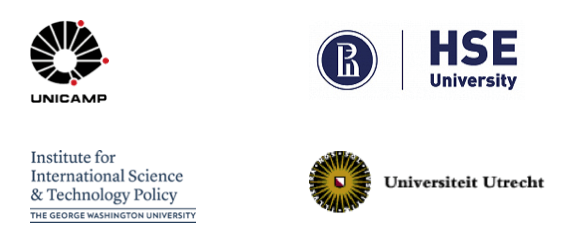
Global Value Chains and Regional Systems of Innovation: Towards a Critical Juncture?
15 October and October 29 2021, online; times shown are Moscow times (CET +1)
Session 1: October 15, 2021
Chair: Dirk Meissner National Research University Higher School of Economics
15.00 Opening / introduction
Bruno Fischer, University of Campinas
15.05 Keynote Speech – Carlo Pietrobelli
Deepening or delinking? Innovative capacity and global value chain participation in the IT industry
Carlo Pietrobelli, Department of Economics, Roma Tre University, Italy; UNU-MERIT, Maastricht, The Netherlands; Antonio Vezzani, Department of Economics, Roma Tre University, Italy
15.30 Embedding in GVCs and Local Ecosystems by Latecomers: Evidence from China’s Integrated Circuit Design Firms
Jiali Liu, Institutes of Science and Development, Chinese Academy of Sciences, CHINA
Discussant: Ron Boschma
16.00 Defining Research Agenda: Scientometric Analysis of Three decades of GVC Research
Shikha Gupta, Faculty of Management Studies, University of Delhi, Delhi, India
Discussant: Dirk Meissner
16.30 Global Value Chains (GVCs) and Productivity Upgrading: A Sectoral Level Nonlinear Approach
Zhuqing Mao, University of Johannesburg College of Business and Economics, Auckland Park, Gauteng SOUTH AFRICA
Discussant: Nicholas Vonortas
17.00 Uncertainty Management in Global Innovation Ecosystems
Ana Lucia Figueiredo Facin, UNESP: Universidade Estadual Paulista Julio de Mesquita Filho, Sao Paulo, BRAZIL
Discussant: Bruno Fischer
17.30 Concluding Remarks
Nicholas Vonortas, George Washington University
Ron Boschma, Utrecht University
Session 2: October 29, 2021
Chair: Nicholas Vonortas, George Washington University
15.00 Opening / Introduction
15.05 Territorial Innovation systems and structural coupling: Exploring network coupling effects on performance in multi-stakeholder initiatives
Jan Vang, University of Southern Denmark, Odense Denmark,
David Hensen, University of Southern Denmark, Odense Denmark
Heidi Wiig, Norwegian Business School, Oslo, Norway
Discussant: Ron Boschma
15.30 Global Value Chains and the International Division Between Countries Producers of Goods and Knowledge–An Empirical Analysis of Trade and Intellectual Property Income
Ludmila Macedo Correa, PhD, Federal Rural University of Rio de Janeiro: Universidade Federal Rural do Rio de Janeiro. Petropolis, RJ BRAZIL
Discussant: Bruno Fischer
16.00 Regional Development, Innovation Systems and Service Companies’ Performance
Joseph Amankwah-Amoah, University of Kent, Chatham, United Kingdom
Discussant: Dirk Meissner
16.30 Sectoral resilience through learning in networks and GVCs: A historical perspective on the food-processing and clothing industries in Poland
Esin Yoruk, Coventry University, Coventry, UNITED KINGDOM
Discussant: Nicholas Vonortas
18.45 Concluding remarks
Bruno Fischer, University of Campinas

Artificial Intelligence, National Security, and Ethics with The Hon. James E. Baker
SPEAKER BIO
The Hon. James E. Baker is a professor at the College of Law with a courtesy appointment in the Maxwell School. Also serving as Director of the Institute for Security Policy and Law, Judge Baker teaches classes on national security law, emerging technologies and national security, ethics, leadership, intelligence, and the laws of war. He started his career as an Infantry Officer in the US Marine Corp, before serving the US Department of State, Foreign Intelligence Advisory Board, and National Security Council. Mostly notably, he served on the US Court of Appeals for the Armed Forces for 15 years—the last four as Chief Judge—before stepping down in 2015. Since 2015, when he was appointed by President Barack Obama, Judge Baker has served as a Member of the Public Interest Declassification Board. He is also a Member of the ABA Rule of Law Initiative (ROLI) Board of Directors; a former Consultant for the Intelligence Advanced Research Projects Activity; and a former Chair of the American Bar Association’s Standing Committee on Law and National Security.
In 2017-2018, Judge Baker was Robert E. Wilhelm Fellow at MIT’s Center for International Studies, where he pursued scholarship on emerging technologies and artificial intelligence. Previous recipients of this prestigious fellowship include former UK Foreign Secretary David Miliband and Adm. William Fallon, former Commander of US Central Command. Judge Baker is the author of two books, In the Common Defense: National Security Law for Perilous Times (Cambridge University Press, 2007) and Regulating Covert Action (Yale University Press, 1992, with Michael Reisman). As a Marine Corps Reserve Officer (1979-2000), he authored the revised Marine Corps Counterinsurgency Field Manual. Subjects addressed in his numerous book chapters and articles range from military justice, transnational law, and covert operations to teaching national security, effective presidential transitions, and the ethics of national security law. Among his several awards, Judge Baker has been honored by the National Security Council, Central Intelligence Agency, and the US Army Command and General Staff College (Honorary Master of Military Arts and Science, 2009).
How Cyber-Secure are US Nuclear Weaspons?
NEW DATE/TIME: May 18, 2021 | 3:30pm-5:00pm EDT
Online via Zoom
About the webinar:
Please join us for a virtual tour of the relationship to and possible impact of cyber technology on all aspects on US nuclear forces and operations. Dr. Herb Lin of Stanford University will preview his forthcoming book on the potential cyber impacts of nuclear weapons design and production, including the Stockpile Stewardship Program, nuclear delivery systems and platforms carrying such systems, advanced cyber-enabled defensive capabilities that might be deployed against US nuclear forces, the nuclear tactical warning and attack assessment system, nuclear command, control, and communications (NC3), the planned modernization of US NC3 systems and, of course, nuclear planning and nuclear decision-making and escalation. Dr. Lin’s presentation will be moderated by Professor Sharon Squassoni, and followed by a question and answer session with participants.
About the speakers:
Dr. Herb Lin is senior research scholar for cyber policy and security at the Center for International Security and Cooperation and Hank J. Holland Fellow in Cyber Policy and Security at the Hoover Institution, both at Stanford University. His research interests relate broadly to policy-related dimensions of cybersecurity and cyberspace, and he is particularly interested in the use of offensive operations in cyberspace as instruments of national policy and in the security dimensions of information warfare and influence operations on national security. In addition to his positions at Stanford University, he is Chief Scientist, Emeritus for the Computer Science and Telecommunications Board, National Research Council (NRC) of the National Academies, where he served from 1990 through 2014 as study director of major projects on public policy and information technology, and Adjunct Senior Research Scholar and Senior Fellow in Cybersecurity (not in residence) at the Saltzman Institute for War and Peace Studies in the School for International and Public Affairs at Columbia University; and a member of the Science and Security Board of the Bulletin of Atomic Scientists. In 2016, he served on President Obama’s Commission on Enhancing National Cybersecurity. Prior to his NRC service, he was a professional staff member and staff scientist for the House Armed Services Committee (1986-1990), where his portfolio included defense policy and arms control issues. He received his doctorate in physics from MIT.
Sharon Squassoni is Research Professor of the Practice of International Affairs in the Institute for International Science & Technology Policy of the Elliott School of International Affairs. Her research focuses on policy approaches to reducing risks from nuclear weapons and nuclear energy. Prior to joining the faculty of the Elliott School, she led the Proliferation Prevention Program at the Center for Strategic & International Studies and was senior research associate with the Carnegie Endowment for International Peace. She served in the US Arms Control & Disarmament Agency, the US State Department and the Library of Congress’ Congressional Research Service from 1992 to 2007. She is on the Science & Security Board of the Bulletin of the Atomic Scientists, the Advisory Board of the PIR Center in Moscow and the Center for Arms Control and Nonproliferation. She is the principle investigator of the Nuclear Boundaries Initiative.
This event will be open to the public/media and will be recorded.

What Technologies Can Secure GPS?
Andrew Hansen, U.S. Department of Transportation
Greg Winfree, Texas Transportation Institute, Texas A&M University
Technology Upgrading and Economic Catch-Up: the New Global Context and the Road Ahead
The Challenges of Technology and Economic Catch-Up in Emerging Economies Workshop 5
Aprtil 22, 2021 | 8:00am-10:00am EDT
View the event recording here.
About the workshop:
The workshop synthesized the main insights and lessons from the previous four workshops and outlined the research and policy road ahead in the new global post-Covid-19 context.
For this last workshop, we received the five editors from the volume “The Challenges of Technology and Economic Catch-Up in Emerging Economies” along with two special guests:
Book overview
Jeong-Dong Lee (Professor of the Interdisciplinary Graduate Program on Technology Management, Economics and Policy (TEMEP) and the Department of Industrial Engineering, Seoul National University. Special Advisor to the President of South Korea on Economy and Science)
Key findings from the book and previous workshops
Dirk Meissner (Professor and Deputy Head of the Institute for Statistical Studies and Economics of Knowledge at Higher School of Economics [HSE], National Research University)
Future research agenda
Slavo Radosevic (Professor of Industry and Innovation Studies at the UCL School of Slavonic and East European Studies, University College London)
Special remarks
Yongsuk Jan (Senior Research Fellow of the Science and Technology Policy Institute [STEPI]. Research Associate at the Center for International Science and Technology Policy [CISTP] of the George Washington University, Washington, DC)
Alfred Watkins (Chairman of the Global Solutions Summit, Senior Advisor to the Global Technology Deployment Initiative and Senior Director of the P80 Group Foundation. He worked for more than 20 years in different areas at the World Bank)
Open Discussion
Moderator: Nicholas Vonortas (Professor of Economics and International Affairs at The George Washington University in Washington D.C. Principal Investigator at InSySPo/Department of Science and Technology Policy, University of Campinas)
Announcement/Conclusion
Keun Lee (Professor at the Department of Economics, Seoul National University. Special Advisor to the President of South Korea, specializing in science and technology policy and economic development)
Co-Organized by:
Institute for International Science and Technology Policy (George Washington University)
InSysPo – Innovation Systems, Strategies and Policy (Department of Science and Technology Policy – Unicamp)
UCL School of Slavonic and East European Studies – University College London
Institute for Statistical Studies and Economics of Knowledge (National Research University/Higher School of Economics)

2021 Bromley Memorial Keynote Address:
Building an Inclusive Science and Engineering Community: Broadening Participation @ Speed & Scale
April 15, 2021 | 4:30pm – 6:00pm EDT
View the Keynote Address here.
The Institute for Science, Society and Policy at the University of Ottawa and the Institute for International Science and Technology Policy at the George Washington University were delighted to host Sethuraman Panchanathan, the Director of the U.S. National Science Foundation (NSF), as part of the 2021 Bromley Memorial Event.
The Honorable Sethuraman Panchanathan is a computer scientist and engineer and the 15th director of the U.S. National Science Foundation (NSF). NSF is an $8.5B independent federal agency and the only government agency charged with advancing all fields of scientific discovery, technological innovation, and STEM education. Dr. Panchanathan has a distinguished career in science, technology, engineering, and education that spans more than three decades. He served as executive vice president of the Arizona State University Knowledge Enterprise, where he also founded the Center for Cognitive Ubiquitous Computing.
Prior to becoming director of NSF, Panchanathan served on the National Science Board for six years and has also served on and chaired numerous high-level research and innovation organizations. He is a fellow of the National Academy of Inventors, the American Association for the Advancement of Science, the Association for Computing Machinery, and other prestigious science and engineering organizations. Dr. Panchanathan’s scientific contributions have advanced the areas of human-centered multimedia computing, haptic user interfaces, person-centered ubiquitous computing technologies for empowering individuals with a range of abilities.
Additional Speakers Included:
Moderator: Jeff Kinder, Senior Fellow of the ISSP, uOttawa and Executive Director, Institute on Governance
Student Discussant: Celeste Digiovanni, PhD Candidate in Environmental Geography at the University of Ottawa. Celeste Digiovanni is a second-year PhD Candidate in Environmental Geography at the University of Ottawa. Her research focuses on the collaborative management of fisheries on the west coast of Vancouver Island. More specifically, Celeste interrogates the ancillary outcomes of this management style in hopes of posing recommendations towards the governance of transient resources. Celeste is also employed by Canada’s Department of Fisheries and Oceans as an Analyst in Strategic and Reconciliation Policy. Celeste received her Master’s degree in Environmental Sociology, where she developed a sustainability program called ‘H 2 Ottawa’. What ties her roles together is Celeste’s passion for mobilizing and translating knowledge amongst and between groups, for the better and more informed management of natural resources.
Student Discussant: Brennan Hoban, Masters candidate in International Science and Technology Policy at the Elliott School, George Washington University. Brennan Hoban is a second-year Masters candidate in the International Science and Technology Policy at the Elliott School, studying the intersection of economic and technology policy with a focus on place-based innovation policy. She received her bachelor’s degree in International Relations and Political Science from American University. Brennan currently works at McKinsey & Company in their Public and Social Sector Practice. She has held past positions at the Brookings Institution and has interned for InterAction in Washington, D.C. and for the U.S. Department of State in Rome. Brennan also studied Urdu as a Global Giver Fellow through the Global Language Network and currently volunteers at the National Press Club.
With introductory remarks from: Monica Gatinger, Director, ISSP and Full Professor at the School of Political Studies, uOttawa and Nicholas Vonortas, Director, ISSTP and Professor of Economics and International Affairs, George Washington University.
Featuring closing remarks from: Alyssa Ayres, Dean of the Elliott School of International Affairs, George Washington University.
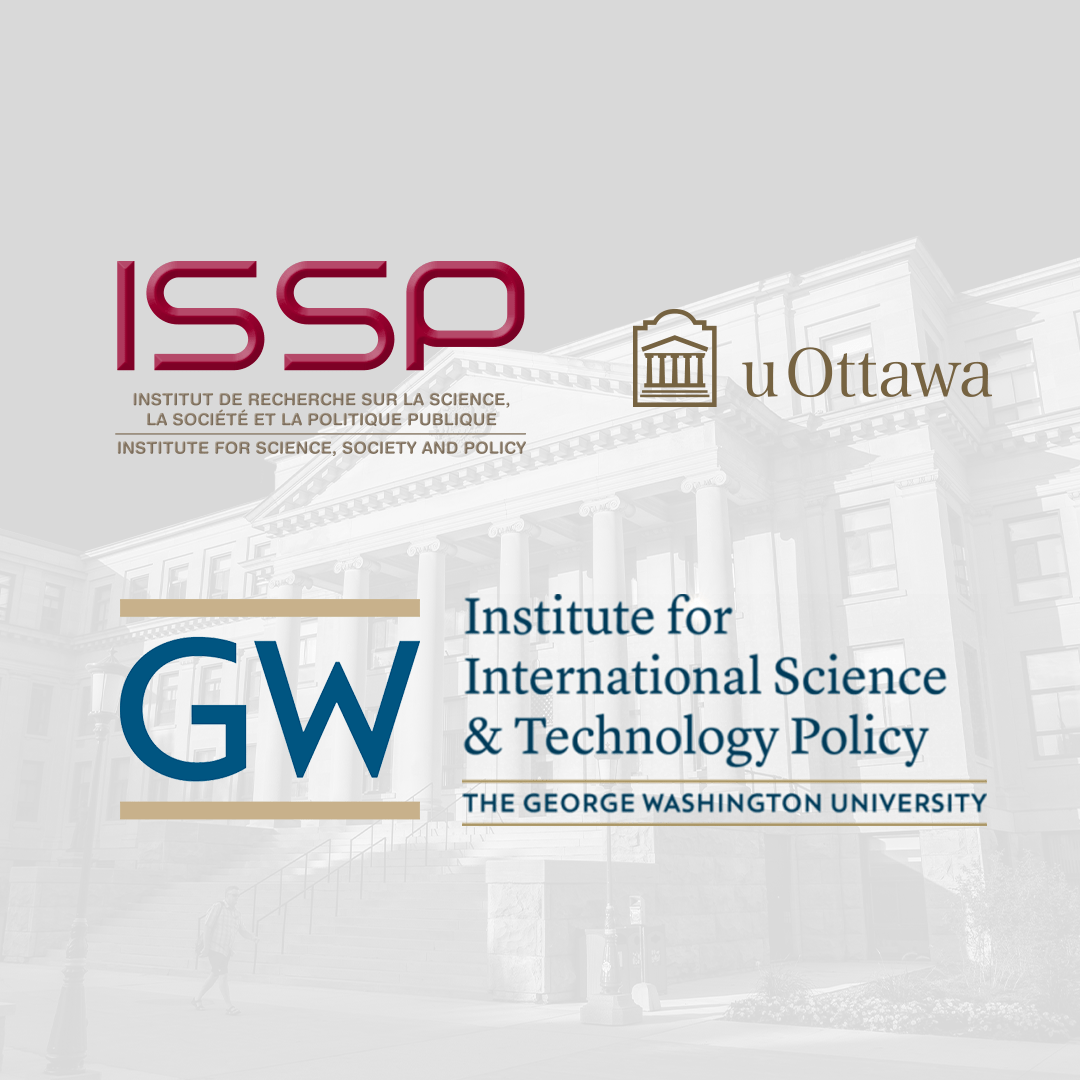
2021 Bromley Memorial Student Symposium:
Talks on Selected Overview Themes
April, 15 2021 | 1:30pm-3:00pm EDT
Open to students from GWU, uOttawa, and STGlobal participants only
Introduction to the Bromley event and its background:
• Professor Monica Gattinger and Professor Nicholas Vonortas
Talks and Panelists:
• Canada S&T landscape and emerging Canada-US STI picture – Mr. Paul Dufour
• US S&T landscape – Professor Nicholas Vonortas and GWU students
• Energy Policy – Professor Monica Gattinger and Professor Nina Kelsey
In partnership with the Nuclear Science and Security Consortium, the Institute for International Science and Technology Policy (IISTP) at GW’s Elliott School of International Affairs is pleased to announce the 3rd GW Boot Camp on Nuclear Security Policy.
The 2021 Boot Camp will be held from June 14-18, 2021 and, this year, it will be delivered online.
The Boot Camp is a unique, week-long course on all aspects of nuclear security policy. The first Boot Camp was hosted in June 2018. Most participants are graduate students (PhD and Masters) and/or early career professionals with a solid background in science and nuclear policy. Taught by experts and policymakers largely from Washington, DC, the program offers unbeatable learning and networking opportunities including:
- classes with internationally recognized nuclear security policy experts,
- talks from experts in a variety of nuclear policy sectors, and
- discussion with key stakeholders in nuclear policy.
Applications are currently being accpted on a rolling basis but we encourage candidates to submit their materials by April 26 to ensure full consideration of their candidacy. A limited number of full and partial scholarships are available based on merit and diversity (if you’re interested in being considered for a scholarship, speak to this in your statement of purpose). Please visit our applications page for more information.
STGlobal Conference 2021
About the Conference:
Contemporary biological, environmental, social, and political crises expose a pressing need to rethink the sciences’ place and orientation in society. Technological innovation and infrastructures have played significant roles in the ongoing COVID-19 pandemic, the climate emergency, the global rise in authoritarianism, and a widespread expansion in economic and social injustice. As policymakers and publics look to the sciences to help address these problems, it becomes increasingly important to reflect upon the current and proper purposes, uses, and aims of the sciences. What communities and values are served by present research and innovation systems? Which are harmed, undercut, or left behind? Our contemporary crises can be understood as outgrowths of neglect for economically and politically marginalized communities in the scoping and orientation of research; and of inattention to the potential dangers, as well as the benefits, of techno-social innovations.
Repair and amelioration, rather than replication and exacerbation, of societal injustices, economic inequalities, and new, technologically facilitated risks to human bodies, communities, and societies require a reconceptualization of whom the sciences aim to serve and how they will do so. New models of science governance, innovation policy, embedded research, and scientific service will be needed if we wish to build more just, more sustainable, and more equitable communities.
For STGlobal 2021, we invited works which address these topics from the perspectives of science and technology policy, science and technology studies, science communication, higher education, sustainability, futures studies, critical theory, and other relevant fields. Research topics may include:
- How the sciences can support the creation of healthier and more inclusive communities
- How the sciences help (or don’t help) publics and policymakers to understand and make decisions about current crises, e.g. COVID-19 or climate change
- The sciences’ roles in articulating and building more alternative or more desirable futures
- How scientists position their work relative to important contemporary issues
- How institutions collaborate with their local communities
- Critical perspectives about knowledge and sociotechnical systems in the contemporary world (which may include feminist, queer and gender, critical race, indigenous, decolonial, disabilities, and other cultural studies)
- How expertise is incorporated in the improvement of participatory community processes
- What science oriented toward community or societal service can or should look like
These are some of the many issues we discussed in this graduate student conference.
NITEC International webinar: Opening the black box of innovation capabilities.
April 13-14, 2021
View the event recordings here:
View the program and confirmed speakers here.
To celebrate its 30th anniversary, the NITEC Innovation Research Center at the Federal University of Rio Grande do Sul (UFRGS), in partnership with the GW’s IISTP, gathered international partners and experts that have significantly contributed to the research field of innovation studies and NITEC’s trajectory. The idea of this event was to seize the opportunity of online platforms and put together experts worldwide to discuss innovation and capabilities.
The event was held (entirely in English) on April 13 and 14, 2021 with different international speakers distributed in two round tables each day. The event aimed to reach participants from all over the world.
Speakers included include Richard Nelson, Franco Malerba, Faiz Gallouj, Anthony Arundel, Keun Lee, Carlo Pietrobelli, Gabriela Dutrénit, Willem van Winden, Laure Morel, Fernanda Reichert, André Alves
View the program and speakers here.
The event is powered by NITEC Innovation Research Center of the Federal University of Rio Grande do Sul (UFRGS) in partnership with GW’s IISTP.

The Macroeconomics of Data
April 12, 11:00AM – 12:00PM EDT
View the event recording here.
About the Webinar:
Data (information that can be encoded as a binary sequence of zeros and ones) has become essential economic inputs. Yet data is different from other inputs; there are many types of data (personal, proprietary, public data, etc…) and the market for personal data is opaque. Moreover, private companies hold huge troves of data that could provide significant insights for society if shared and aggregated with data from other sources.
On April 12, the Hub co-hosted the first of two webinars on the economics of data. Our first discussion was moderated by GWU Economics Professor Tara Sinclair, an expert both in big data and economic forecasting. Our speakers included Yan Carrière-Swallow and Vikram Haksar of the IMF who wrote an influential 2019 paper, “The Economics and Implications of Data: An integrated Perspective,” (short version). We will also hear from Brenda Bugge, an official from Stats Canada who was the lead author on both “Measuring investment in data, databases and data science: Conceptual framework” and a pathbreaking study, “The value of data in Canada: Experimental estimates”.
Speakers:
Brenda Bugge, Assistant Director, National Accounts, Stats Canada
Yan Carrière-Swallow, Economist, Policy, Strategy and Review, International Monetary Fund
Vikram Haksar, Assistant Director, Macrofinancial Analysis at the International Monetary Fund
Moderator: Tara Sinclair, Associate Professor of Economics and International Affairs, GWU
Where: Zoom.us
Innovation Policy for Technology Upgrading
The Challenges of Technology and Economic Catch-Up in Emerging Economies Workshop 4
March 25, 2021 | 8am-10am EDT
Missed the webinar? View the recording here.
About the workshop:
This workshop explored different facets of innovation policies for technology upgrading in the context of significantly changing policy philosophies evolving from import substitution earlier on and the Washington consensus policies more recently to the post-Covid19 context of today. Specifically, the workshop explored the role of strategic intent and policy leadership in technology upgrading as well as how countries can reshape the nature of the existing value chains and innovation networks dominated by foreign multinational enterprises (MNEs)? How to set initiatives and programs to use Global Value Chains (GVCs) as levers for local technology accumulation? What are the limits of GVC only technology upgrading policies? Finally, how should policymakers go about implementing new policy? How to design and implement programs which will recognize the danger of failure, vested interests as well as low policy capacity endemic to emerging economies?
Presentation topics:
“Using Large-Scale Programs to Help Develop Technological Capabilities: Cases in China”
Xudong Gao (Professor of the Department of Innovation, Entrepreneurship and Strategy, Tsinghua University)
“Industrial and Innovation Policies in a World of Global Value Chains”
Carlo Pietrobelli (Head of Department and Professor of Economics at University Roma Tre, Italy, Professorial Fellow at UNU-MERIT, Maastricht, and Adjunct Professor at Georgetown University, Washington D.C.)
“Experimentalist Governance for Technology Upgrading: New Industrial Policy Process”
Yevgeny Kuznetsov (Senior Research Fellow at the Migration Policy Institute; and Consultant at World Bank)
Institute for International Science and Technology Policy (George Washington University)
InSysPo – Innovation Systems, Strategies and Policy (Department of Science and Technology Policy – University of Campinas)
UCL School of Slavonic and East European Studies – University College London
Institute for Statistical Studies and Economics of Knowledge (National Research University/Higher School of Economics)
STGlobal Webinar: Exploring Data and Labor in an Unequal Digital Economy
March 26 | 11:00am – 12:00pm EDT
STGlobal was pleased to announce its March Knowledge in Action Webinar, featuring researchers studying and working on data, labor, and justice!
Abstract
There has been increasing focus on the role of machine learning in collecting, analyzing, and manipulating data that reflect and shape contemporary life. Yet, there is relatively little focus on the human labor required for tasks that appear to be automated. Moreover, as digital labor scholars have pointed out, such workers tend to be located in the “Global South,” providing cheap labor for tech corporations based in the “Global North.” Meanwhile, data collection processes can function as methods of surveillance that discipline workers and potentially exacerbate inequalities affecting marginalized workers. This webinar attended to such issues by exploring the interplay of data and labor in an unequal digital economy.
Speakers
Nikki Stevens (they/them) (http://www.nikkistevens.com) is a long-time software engineer and a open-source contributor and advocate. They have been an open-source contributor for the last 12 years, and have spent the last few years specifically focused on challenging open source communities to consider ethics in their practices. They won the 2017 Aaron Winborn Award (https://www.drupal.org/node/
Kylie Jarrett (she/her) is Associate Professor in Digital Media in the Department of Media Studies at Maynooth University. She is author of Feminism, Labour and Digital Media: The Digital Housewife and co-author of #NSFW: Sex, Humor, and Risk in Social Media and Google and the Culture of Search. She has published extensively on the commercial Web and is currently working on a book titled Digital Labour to be published with Polity.
Filipe Calvão (he/him) is a socio-cultural anthropologist whose research lies at the intersection between nature, culture and capital in postcolonial Africa; with a focus on extractive economies, mining labor and corporate governance. In his published work, he examines the social and cultural relations binding mining communities and corporations, the materiality of minerals and labor in the global south. He has taught on global extractive networks, the anthropology of corporations, illicit economies, secrecy and surveillance, work and labor, and social theory.
Moderator
Rae Jereza (they/them) is a PhD candidate at Binghamton University (SUNY) with research interests at the intersection of digital labor, far-right politics, and liberalism. Their dissertation focuses on the lived realities of Facebook content moderators and what their experiences might tell us about online sociality in an era of far-right resurgence. You can follow them on Twitter @raejereza and learn more about them on their website, https://www.rachellejereza.com

What Are We Talking About When We Talk About Digital Protectionism?
March 24, 11:00 AM – 12:00 PM EDT
Missed the event? Watch it here.
About the Webinar:
This webinar sought to create a broader understanding of how some nations, other than the US, define digital protectionism. Specifically, how these policymakers will decide who is injured by digital protectionism, how to remedy these harms, how to address such barriers in trade agreements (e.g. bans, exceptions, sanctions?), and what are the barriers they expect to see in the future?
Speakers:
- Nick Russell, Deputy Director – Digital Trade Team, UK Department of Digital, Culture, Ministry and Sport
- Nicholas Schubert, Head – Department of Digital Economy, Undersecretariat for International Economic Affairs of Chile
- Darren Smith, Director – Services Trade Policy Division, Global Affairs Canada
Moderated by:
- Susan Ariel Aaronson, Research Professor and Director, Digital Trade and Data Governance Hub, George Washington University

STGlobal Webinar: Addressing Internet Access Disparities
Emerging paradigm on technology capability upgrading: embracing green, inclusive and social sustainability concerns.
The Challenges of Technology and Economic Catch-Up in Emerging Economies Workshop 3
February 25, 2021 | 7am-9am EST
Missed the event? View the workshop recording.
About the workshop:
Traditionally technology upgrading of emerging economies has been framed within the catching up and economic growth perspective. A major new development is the changing nature of technology through the ongoing increasing application of artificial intelligence; the demise of the fossil-fuel-based growth regime; increasing concerns with equity and inclusiveness of technology. The new objective of catching up is not only economic growth as measured by GDP, but it includes sustainable development and green growth. These emerging issues and challenges for catching up economies are the core of the new research paradigm on technology upgrading. Is the shift to green growth of catching up economies an option or necessity? What does this shift entail for technology upgrading research and related policies? How to ensure that technology-driven ‘creative destruction’ entails structural change while avoiding exclusionary outcomes? The broader socioeconomic and political environment powerfully shapes technology capability accumulation. Thus the political economy of technology accumulation is inseparable from understanding different paths of technology upgrading. What are the implications for the technology upgrading research agenda?
The February 25 workshop explored these and other questions.
Presentation topics included:
“Catching Up or Developing Differently? Techno-Institutional Learning with a Sustainable Planet in Mind”
Tilman Altenburg (Head of the Programme “Transformation of Economic and Social Systems” at the German Development Institute)
“Leapfrogging on Steroids: China’s Green Growth Strategies”
John Mathews (Professor Emeritus in the Macquarie Business School at Macquarie University)
“Innovation for Inclusive Structural Change”
Tommaso Ciarli (Senior Research Fellow at the Science Policy Research Unit, Sussex University)
Maria Savona (Professor of Innovation and Evolutionary Economics at the Science Policy Research Unit, Sussex University)
Jodie Thorpe (Research Fellow at the Institute of Development Studies)
“Evolutionary Spheres that Condition the Technological Capabilities Accumulation in Latin America”
Gabriela Dutrénit (Coordinador of the posgraduate studies on economics, management and policies of innovation at Universidad Autónoma Metropolitana)
José Miguel Natera (Research Fellow at CONACYT, Universidad Autónoma Metropolitana)
Martín Puchet (Professor at the School of Economics, Universidad Autónoma Metropolitana)
Alexandre O. Vera Cruz (Professor at the Economics and Innovation Management Graduate Program, Universidad Autónoma Metropolitana)
Institute for International Science and Technology Policy (George Washington University)
InSysPo – Innovation Systems, Strategies and Policy (Department of Science and Technology Policy – University of Campinas)
UCL School of Slavonic and East European Studies – University College London
Institute for Statistical Studies and Economics of Knowledge (National Research University/Higher School of Economics)
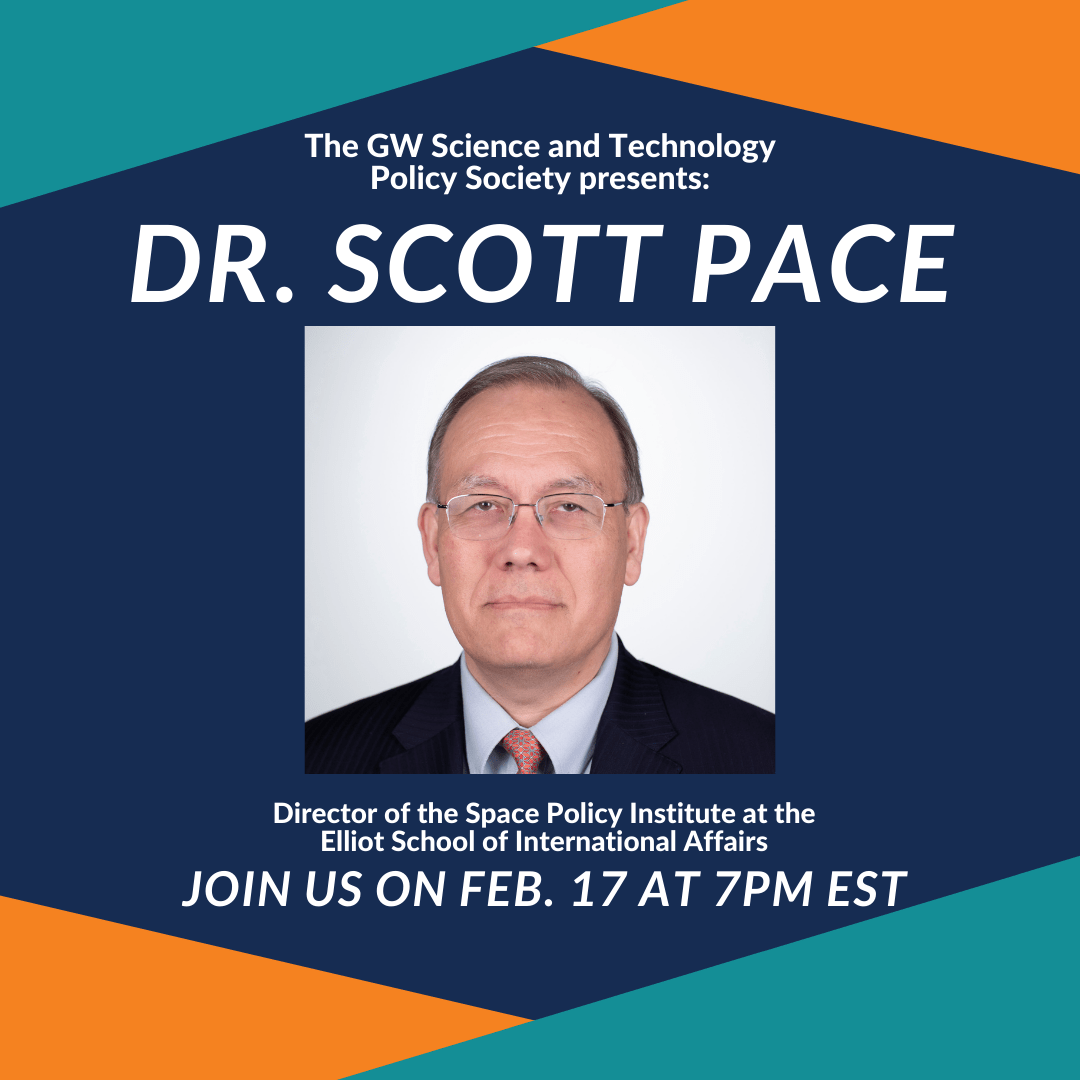
The newly formed GW Science and Technology Policy Society (GW STPS) is honored to host Dr. Scott Pace (Bio) on February 17th at 7:00 PM EST for our inaugural “Prof Talk”.
Dr. Pace will utilize his decades of experience to discuss the policy issues likely to affect the next generation of policy practitioners.
Dr. Pace has recently returned to his role as Director of GW’s Space Policy Institute after serving as the Deputy Assistant to the President and Executive Secretary of the National Space Council. Dr. Pace has been with the GW Elliott School of International Affairs since 2008. Before 2008, he served as the Associate Administrator for Program Analysis and Evaluation at NASA, the Deputy Chief of Staff for the NASA Administrator, and Assistant Director for Space and Aeronautics in the White House Office of Science and Technology Policy.

The Space Policy Institute and IISTP are pleased to present a new webinar:
SHAPING S&T POLICY: US & INTERNATIONAL PERSPECTIVES
Featuring Professors Scott Pace and Pascale Ehrenfreund and moderated by Professor Sharon Squassoni
Wednesday, February 10, 2021 | 11am EST – 12:30pm EST | Online via Zoom
The Elliott School of International Affairs welcomes back Prof. Scott Pace and Prof. Pascale Ehrenfreund after their extended leaves of absence for government service. As Executive Secretary of the National Space Council at the White House, Dr. Pace was involved in defining and shaping national space policy, programs and budgets. Dr. Ehrenfreund served as Chair of the Executive Board of the German Aerospace Center (DLR) between 2015-2020 and is currently the President of the International Astronautical Federation (IAF). This webinar featured Scott and Pascale sharing their experiences and lessons about the development of the space sector in the United States and Europe respectively, and the potential implications for international cooperation and public-private partnerships in science and exploration.
Missed the event? View the recording.

STGlobal Webinar: STS and Science: Divides, Tensions, and Integration
January 22, 2021
Missed the event? Check out the recording.
The field of science and technology studies (STS) has sought to describe, and increasingly to evaluate, inform, and shape, the relationships between scientific research, technological innovation, and their societal contexts, inputs, and effects. However, STS practitioners have often faced difficulty in managing the tension between maintaining critical or analytical distance; and engaging in the discourse and practice of research and innovation processes. STS has stood near the core of large efforts to rethink the relationship between science and society, e.g. Responsible Research and Innovation initiatives, but the uptake or awareness of such efforts by scientific practitioners has been limited. Interactions between humanists, social scientists, and natural scientists is often marked by mutual misunderstanding. In this webinar, we will discussed what it means to integrate STS with the sciences, and “do science differently”, with the prospects for better societal outcomes as a result.
Jack Stilgoe is a Senior Lecturer at University College London. His research focuses on governance of emerging technologies, and responsible research and innovation.
Erin Gleeson is a Program Manager for the American Geophysical Union’s Thriving Earth Exchange. Thriving Earth Exchange is a program that connects communities and scientists to do science together to advance community priorities.
Luísa Reis Castro is a PhD candidate at MIT (HASTS). Her research investigates the relationship between the environment and health by analyzing strategies to address mosquito-borne diseases in Brazil, and associated public health policies.
Kirstie Dobbs is Lecturer at Merrimack College. Her research focuses various modes of youth political participation such as voter behavior, involvement in political parties, and civic engagement through protests and civil society.
Moderator
Andi Hess is the director of the Interdisciplinary Translation and Integration Sciences Initiative at Arizona State University. In her research, Andi investigates interdisciplinarity, and the exchange of knowledge across disciplines in team research settings.

Data Governance Webinar: What are our Rights and Responsibility Over Data?
January 22, 2021 | 11:00 AM – 12:00 PM EST
Watch the event recording here.
About the Webinar:
Big data analytics is the secret sauce of the American polity and economy—widely utilized but poorly understood. Big data analytics often requires a huge supply of personal data (both individual and collective data), which is collected, anonymized, and then grouped. Organizations use various types of big data analytics to make decisions, correlations, and predictions about their constituents and stakeholders.
However, recent history is rife with examples of bias and individual as well as collective data-driven harms (harms to groups of individuals). For example, a 2019 study, published by Science found that some U.S. hospitals and insurers managed care by utilizing an algorithm that discriminated against people of color with complex medical needs. Policymakers bear some of the blame; modern American privacy law encourages companies to extract as much value as possible from personal data in the short term.
In this webinar, two speakers presented different visions of data governance and described strategies to address individual and collective harms. Our first speaker, Martin Tisné, is the Managing director of Luminate, and the author of The Data Delusion, Protecting Individual Data is not Enough when the Harm is Collective, which inspired this webinar. Our second speaker, Janet Haven, is the Executive Director of Data & Society, a NYC based independent nonprofit research institute that studies the social implications of data-centric technologies and automation.
Speakers included:
Martin Tisné, Managing Director, Luminate
Janet Haven, Executive Director, Data & Society

Data Governance Webinar: Is the WTO the best place to govern data?
December 18, 11:00 AM – 12:15 PM EDT
Missed the webinar? Catch up with the recording.
About the Webinar:
A growing number of governments use trade agreements to govern cross-border data flows. However, data is different from other goods and services long governed by such agreements. Data may not always be “traded” and many nations don’t yet know how to govern various types of data (personal, public, proprietary etc..or the mixing of data).
Meanwhile, a growing number of governments around the world are adopting national (or subnational) laws, regulations, directives, and orders to govern data. Some of these requirements, with or without intent, impede the free flow of data across borders. Such restrictions on international data flows can make the trading of goods and services across borders costlier, if not impossible.
In 2019, 74 (now 86) WTO members agreed to negotiate rules to govern trade-related aspects of e-commerce at the WTO. The negotiators have made progress on a wide variety of issues. Yet, given different approaches to data governance, digital prowess, and understanding of how data is changing the economy, is the WTO the right regime to govern cross-border data flows? Or do we need a new distinct international regime built around the various types of data, such as a Data Standards Board?
Speakers included:
- Kristina Irion, Assistant Professor, Institute for Information Law, University of Amsterdam
- Patrick Leblond, Paul M. Tellier Chair, University of Ottawa and Senior Fellow, CIGI
- Rachel Stelly, Policy Counsel, International Trade, Computer and Communications Industry Association
- Lee Tuthill, WTO Secretariat
Moderator: Susan Ariel Aaronson, Research Professor and Director, Digital Trade and Data Governance Hub, George Washington University

STGlobal Webinar: Visions of Futures After 2020
December 18, 2020 | 10:00am – 11:00am EDT
Missed the webinar? Catch up with the recording.
STGlobal is pleased to announce our December webinar, organized in cooperation with the School for the Future of Innovation in Society at Arizona State University.
The futures are a space in constant production. They are uncertain, diverse, unexpected, and relevant to everyone´s lives. Future Studies, Anticipation, Foresight, Speculative Design, and several other fields have tools, perspectives, and strategies to produce and study participative images of the future. In this session, we invited a globally diverse group of researchers and scholars to exchange perspectives about what may be coming after 2020.
Speakers
Sandjar Kozubaev is a researcher, designer and educator. He currently works at Mailchimp, a marketing technology company, where he leads a team of service designers. He is currently a PhD candidate in Digital Media at Georgia Institute of Technology focusing on speculative design, futures and civic engagements. His current research project focuses on design for public librarianship.
Twitter: @sandjar
Kristen Koopman is a graduate student in Science and Technology Studies at Virginia Tech. Her research looks at social values, particularly those related to race and gender, in cultural contexts adjacent to science and technology. Because she is a nerd, this is mostly in speculative fiction, which she also consumes and writes.
Twitter: @kakoopman
Maryam Heidaripour is a feminist design researcher specializing in tools and approaches to generate alternative futures with communities. It includes planning and facilitating participatory workshops to critically examine autonomous vehicles, digital fabrication, and advanced manufacturing. Born and raised in Iran, Maryam has completed her doctoral studies at the Institute of Design at Illinois Institute of Technology. She is currently working with the Community of the Future Program at ComEd, responsible for crafting energy futures for thriving communities.
Twitter: @maryamhpr
Joshua Loughman is a doctoral student in the Human and Social Dimensions of Science and Technology at Arizona State University. His research explores how predicted futures from models and narrative futures from scenarios represent distinct design alternatives for the prospects of a sustainable energy transition. Also at ASU, he is a Lecturer in engineering and directs the Engineering Projects in Community Service (EPICS) program. For 2020, he was a Fellow at the Knowledge Exchange for Resilience, a university-community collaboration at ASU. He is a member of the World Economic Forum Expert Network as an expert on the future of energy. Prior to his current roles he spent a decade in the space industry as a systems engineer.
Twitter: @josh_loughman
Technology Capabilities and Sectoral Catch-Up: what explains success, failures, and challenges?
The Challenges of Technology and Economic Catch-Up in Emerging Economies Workshop 2
December 3, 2020 | 7am-9am EDT
Missed the event? View the recording.
About the workshop:
The workshop explored why technology upgrading is a complex and historically contingent process where outcomes are dependent on a variety of mutually interrelated factors whose outcomes are far from certain. Strategic intent may not suffice unless there is a required level of technological capabilities complemented by the robust mechanism for rapid technological transfer. How can we explain failures in the cases of with strong market and institutional ‘windows of opportunity’? In other cases, technological capability and even forging ahead may emerge as a bottom-up strategic response to changing ‘windows of opportunity’ which employ a variety of technology acquisition mechanisms. How do we explain unexpected success stories of technology upgrading in emerging economies? Furthermore, technology accumulation strategies fit for ‘catching up’ stages may not suffice for post-catching stages which require a new level and quality of capabilities which go beyond technology capabilities. What are lessons from the cases of post-catchup failures?
Those are some of the questions we dealt with on December 3.
Presentations included:
Macro and Micro Foundations for Technology Upgrading and Innovation: The Case of Shipbuilding and Offshore Industry Missed Window of Opportunity in Brazil
André Cherubini Alves (Professor of Innovation at São Paulo School of Business Administration – Getulio Vargas Foundation)
Nicholas Vonortas (Professor of Economics and International Affairs at The George Washington University in Washington D.C; Principal Investigator at InSySPo/Department of Science and Technology Policy, University of Campinas)
Paulo Zawislak (Professor at the Management School, Federal University of Rio Grande do Sul)
Technology Upgrading in Natural Resource-Intensive Industries: Evidence from the Brazilian Mining Industry
Paulo Figueiredo (Professor of Technology and Innovation Management at the Brazilian School of Public and Business Administration – Getulio Vargas Foundation)
Janaina Piana (Professor at the Business Department, Federal University of Technology – Paraná)
Upgrading Non-technological Capabilities: Evidence From Korean Firms
Jae Yong Choung (Professor at the College of Business, Korea Advanced Institute of Science and Technology in the fields of Science and Technology Policy, and Innovation management)
Hye-Ran Hwang (Department of Industrial Innovation at the Daejeon Development Institute)
Institute for International Science and Technology Policy (George Washington University)
InSysPo – Innovation Systems, Strategies and Policy (Department of Science and Technology Policy – University of Campinas)
UCL School of Slavonic and East European Studies – University College London
Institute for Statistical Studies and Economics of Knowledge (National Research University/Higher School of Economics)

Technology capabilities and their impact on growth and catching up
The Challenges of Technology and Economic Catch-Up in Emerging Economies Workshop 1
November 4 | 7am-9am EDT
About the workshop:
The workshop explored the role of technological capabilities and their impact on growth and economic catching up. Technological capabilities are conceptualised and measured as differentiated categories and different contributions explore their relations to economic performance measures, including their relationship to conventional productivity measures. What are the significant insights from analyses which open new avenues for exploring the link between technology upgrading and economic growth? The process of accumulation of technological capabilities is highly heterogeneous across firms and countries; it is both path dependent and non-linear. Further accumulation of technological capabilities is not automatic as countries and firms face new requirements. Thus ‘capability transition failures’ but also opportunities for ‘leapfrogging’ are to be expected. What are the implications of this new understanding of technology upgrading dynamics for research and policy?
Presentation topics included:
Capabilities, Competitiveness, Nations
Jan Fagerberg (Professor at the Centre for Technology, Innovation and Culture, University of Oslo)
Martin Srholec (Deputy Director for Research, Center for Economic Research and Graduate Education – Economics Institute)
Technology Upgrading in Emerging Economies: A New Approach to its Measurement, Results, and Relationship to Mainstream Measures
Randolph Luca Bruno (Associate Professor in Economics at the UCL School of Slavonic and East European Studies, University College London)
Kirill Osaulenko (PhD Candidate at the UCL School of Slavonic and East European Studies, University College London)
Slavo Radosevic (Professor of Industry and Innovation Studies at the UCL School of Slavonic and East European Studies, University College London)
Middle Innovation Trap: Capability Transition Failure and Stalled Economic Growth” (JD Lee, C Baek, J Yeon)
Jeong-Dong Lee (Professor of Interdisciplinary Graduate Program on Technology Management, Economics and Policy at the Department of Industrial Engineering, Seoul National University)
Chulwoo Baek (Associate Professor at the Department of International Trade, Duksung Women’s University)
Jung-In Yeon (PhD in Economics at the SNU Technology Management, Economics and Policy Program, Seoul National University)
Economics of Technological Leapfrogging
Keun Lee (Professor at the Department of Economics, Seoul National University)
Innovation Surveys as Evidence of Technological Upgrading and Catch-Up Studies
Vitaliy Roud (Deputy Head at the Institute for Statistical Studies and Economics of Knowledge/Laboratory for Economics of Innovation, Higher School of Economics, National Research University)
Institute for International Science and Technology Policy (George Washington University)
InSysPo – Innovation Systems, Strategies and Policy (Department of Science and Technology Policy – University of Campinas)
UCL School of Slavonic and East European Studies – University College London
Institute for Statistical Studies and Economics of Knowledge (National Research University/Higher School of Economics)

Data Governance Webinar: According to Shakespeare, “Every Cloud Engenders Not a Storm”
Monday, November 23, 10:30AM-12:00PM EST
Users were first introduced to the idea that their data was stored somewhere in the ether, aka “the cloud” around 2010. But that vague notion of the cloud was not reality. In the decade that followed, cloud computing has shaped how firms store, utilize and assess data. Despite its many benefits, the cloud presents new challenges for data security. Some nations have responded to this challenge by asserting that they must have their own national cloud. This webinar focused on the role of data in cloud computing, data sovereignty, and related security issues. Three speakers examined cloud computing from different vantage points in a moderated discussion.
Speakers:
– Trey Herr, Director, Cyber Statecraft Initiative, The Atlantic Council
– Josephine Wolff, Assistant Professor, Cybersecurity Policy, Tufts University
– Chelsea J. Smethurst, Senior Security Strategy, Cybersecurity Strategy, Microsoft
Moderator:
Knowledge in Action Webinar: Inequities and Power Struggles in Science Communication | October 23, 2020 11am-12pm EDT
Science communication and public engagement are often seen as effective ways for researchers to disseminate their ideas to a wider audience. But these practices still largely overlook the efforts of historically marginalized and minority communities. As a result, intellectual assets and epistemologies from certain regions, religions, genders, and nationalities are undermined in public debates. In this webinar, we heard from some science communication researchers and practitioners who have been trying to empower marginalized voices through their work and discussed the inherent power structures within science communication and what it might take to dismantle them.
Dr. Megan K. Halpern is an Assistant Professor at Michigan State University where she teaches in Lyman Briggs College for Science. She is the inaugural Scholar in Residence at MSU’s Center for Interdisciplinarity. Her research interests include art-science studies, interdisciplinary collaboration, public engagement with science, feminist approaches to science communication, and research through design. She earned her PhD in Science Communication at Cornell University and completed a Postdoctoral Research Fellowship at Arizona State University’s Center for Nanotechnology and Society and Center for Science and the Imagination. Before earning her PhD, Dr. Halpern was a theatre artist and the co-founder and Artistic Director of Redshift Productions, a company that created performances inspired by science.
Pamela Buchan is currently writing up her interdisciplinary PhD into marine citizenship and has been an elected city councillor in Plymouth since 2018. Between researching marine biology and returning to academia as a marine social scientist, Pam had a nine year career in science communication with the British Science Association, managing volunteers and leading a network of science communicators. Pam is particularly interested in evidence-based policy-making and democratisation of science. She is an advocate of public participation at the science-society interface.
Verah Okeyo is an award-winning global health reporter from East Africa’s Daily Nation newspaper, published by the media conglomerate Nation Media Group. She is also the company’s Diversity Inclusion and Equity’s editor. Verah holds a BA in Media Communication and Technology (Electronic option) with IT with a minor in Creative and Performing arts from Kenya’s Maseno University and an MSC in global media and communications from the London School of Economics and Political Science in the United Kingdom. Her dissertation—the impact of foundation-funded journalism and the impact of science reporting in Kenya— is an indication of her research interest on the political economy of science journalism and communication in East Africa. She is also about to complete her post-graduate diploma in education. Verah likes music, textiles, children and animals and spends her spare time reading about them, in a school teaching, in her spare bedroom sewing or playing in bands. She tweets as @VerahOkeyo
Shireen Azam is an editor, researcher, and writer interested in the intersections of academia and journalism, and in making research accessible to a wider audience. At the Economic & Political Weekly, she founded the digital initiative Engage, which reimagined the possibilities offered by the digital medium for visualising and communicating research. Her research background has been interdisciplinary but centred around themes in political philosophy — specifically, conceptualising the fault lines of secularism in India. Her writings have appeared in the Caravan Magazine, Indian Express, Mint, EPW, FirstPost, etc. She recently started her PhD at the University of Oxford, studying the invisibilisation of caste among Muslims.
Deep Time Reckoning: How Future Thinking Can Help Earth Now | Wednesday, October 14, 2020 1:30 PM – 2:30 PM EST
The Saga of TikTok and WeChat | Friday, October 09, 10:00AM – 11:00AM EDT
On August 6, the Trump Administration published an executive order targeting Chinese social media platforms TikTok and WeChat. The order purported to ban the two apps from being downloaded and processing transactions in the United States. A week later, Trump threatened to ban TikTok entirely if it did not sell to a U.S. company by the middle of November.
A U.S. federal court blocked the ban on Tiktok and soon after, the ban on WeChat.
This webinar examined the saga of TikTok and WeChat in the United States, focusing in particular on the implications for America’s leadership of the open Internet and digital rights.
TikTok and WeChat have a convoluted history in America. After the video app Tiktok became the first Chinese “viral” video platform in the US (and globally), policymakers expressed concern about the firm’s access to the personal data of Americans. In October 2019, several senators called for a formal investigation into whether TikTok represented a national security risk. Meanwhile, an armof the U.S. Treasury examined the same question.
Our speakers were:
– Ana Swanson, Trade and International Economics Reporter, NY Times
– Anupam Chander, Professor of Law, Georgetown University Law Center
– Henry Gao, Associate Professor of Law, Singapore Management University
Moderated by Hillary Brill, Interim Director, Institute for Technology Law & Policy, Georgetown University Law Center
Missed the event? Check out the event recording.
Knowledge in Action Webinar: Scholarly Communication for Policy Impact | Friday, September 25, 2020 2-3:30pm EDT
Training the next generation of STEM leaders requires developing strong communication skills in order to make scholarly work accessible to broad audiences. Join STGlobal and the Journal of Science Policy & Governance (JSPG) for this webinar showcasing panelists who will share their knowledge on effective scholarly communication practices, and ways to maximize societal impact of published work in the policymaking process.
Elisabeth Graffy is Professor of Practice in the School for the Future of Innovation in Society and in the Consortium for Science, Policy and Outcomes (CSPO) at Arizona State University. She co-directs the Energy and Society program within ASU-LightWorks and the Environmental Humanities Initiative in the Julie Ann Wrigley Global Institute of Sustainability. She founded and leads the Spirituality and Sustainability Initiative (SSI) and the Household Independent Power Project (HIPP).
With two decades of governmental, private sector and NGO leadership experience prior to joining the faculty at ASU, Graffy has advised and led numerous organizational initiatives and authored dozens of academic, governmental and other publications. Among her many accomplishments, Professor Graffy was elected Chair of the Section on Women in Public Administration, the largest membership section in the American Association of Public Administration, and continues to advise and consult on public sector projects.
Jessica Polka, PhD serves as Executive Director of ASAPbio, a researcher-driven nonprofit organization working to promote innovation and transparency in life sciences publishing in areas such as preprinting and open peer review. Prior to this, she performed postdoctoral research in the department of Systems Biology at Harvard Medical School following a PhD in Biochemistry & Cell Biology from UCSF. Jessica is also a Plan S Ambassador, an affiliate of the Knowledge Futures Group, and a steering committee member of Rescuing Biomedical Research.
Anna Hatch, PhD, is the Program Director for the Declaration on Research Assessment (DORA), where she works to help the academic community address biases and advance practical and robust approaches to research assessment globally. DORA aims to raise awareness of new tools and processes for research assessment, facilitate the implementation of good practices, catalyze change, and improve equity by calling for broader representation of researchers in the design of research assessment practices that directly address structural inequalities in academia. Anna was previously a science policy fellow at Research!America, a nonprofit advocacy alliance to increase public and policymaker awareness of the benefits of medical research. She received her PhD in Biochemistry from Dartmouth College where her research focused on mitochondrial dynamics.
Nicole Catanzarite is an Early Career Policy Ambassador at the Society for Neuroscience and serves as NeuroPolicy Liaison for the society’s DC Metro Area Chapter. Nicole’s research spans science and technology as she is serving on a strategic advisory board for a technology-security policy forecasting project at the Center for Security and Emerging Technology while completing the final year of her PhD in Neuroscience and Cognitive Science at the University of Maryland.
This webinar is organized STGlobal is organized in cooperation with the Journal of Science Policy & Governance and the School for the Future of Innovation in Society at Arizona State University.

What Can the US Government do to Encourage AI Competitiveness? | Thursday September 17, 12:00PM – 1:00PM EDT
US policymakers see AI as a technology of great strategic importance. This webinar examined several new ideas on how to advance US AI competitiveness.
One idea, proposed by some of America’s most prominent AI scholars, calls for the US government to subsidize the costs of accessing the high power cloud computing resources of large tech companies. This strategy would allow academic researchers to get access to high power computing, while companies and the nation would benefit from more advanced academic research and a better prepared workforce. Another idea is to encourage large-scale research through centers and institutes. In this regard, NSF announced seven new AI institutes at universities—five funded by NSF and two funded by USDA. These institutes will advance and leverage AI techniques to address wicked problems such as how to address extreme weather. Finally, another idea is to work internationally to support the responsible development and use of AI. The US is thus working with 14 other nations at the OECD to build the Global Partnership on AI: a multi-stakeholder initiative working on the responsible use of AI; data governance for AI; the future of work; and innovation and commercialisation of AI. Our speakers will be:
– Dr. Lynne Parker, Deputy Chief Technology Officer of the United States, Assistant Director of Artificial Intelligence at the White House Office of Science and Technology Policy (OSTP), and Professor, Electrical Engineering and Computer Science, University of Tennessee, Knoxville.
– Professor John Etchemendy, co-director of the Stanford Institute for Human-Centered Artificial Intelligence, Professor and Former Provost, Stanford University
– Professor Ed Lazowska, Professor, and Bill & Melinda Gates Chair emeritus, Paul G. Allen School of Computer Science & Engineering, University of Washington
Our moderator was Sam Mulopulos, Office of Senator Rob Portman, Chair, Senate AI Caucus, Director, Tech Staff Committee
How will 3D Printing Affect Trade and Trade Rules? | Thursday, September 10th at 12PM EDT.
The 12th data governance series event was co-sponsored by the World Wide Web Foundation, the Internet Society of Washington, DC (ISOC-DC), the Centre for International Governance Innovation, the Institute for International Economic Policy, the GW Center for International Business Education and Research, and the Institute for International Science & Technology Policy.
3D printing refers to a manufacturing process in which a material is joined or solidified to create a multi-dimensional object based on a digital model (such as a 3D model). 3D printing will make it easier to customize products and localize supply chains. 3D printing also has the potential to uproot trade, altering comparative advantage and enabling industrialized companies to substitute technology for labor. Hence, policymakers may need to rethink trade rules and developing countries to reconsider their development strategies. This event’s speakers have both published on 3D printing and can challenge our ideas about winners and losers.
Speakers:
–– Ziyang Fan, Director, Digital Trade, The World Economic Forum, Paper link
– Michele Ruta, Lead Economist the World Bank, Research Link
Knowledge in Action Webinar: What is Public Interest Technology | Friday, August 28, 2020 11am-12pm
The emerging field of Public Interest Technology (PIT) aims to improve the public outcomes of technologies, but significant questions remain as to what that means. How are “publics” and their interests to be defined? What distinguishes PIT from other efforts to improve the public value of technologies? Who practices PIT, where, and how? And what does it mean for students? Join Hana Schank, New America Director of Strategy for Public Interest Technology; Dave Guston, SFIS founding director and ASU PIT Network representative; and data ethics practitioner Dan Wu to discussed these and other questions in STGlobal’s August webinar.
Speakers
Hana Schank is the Director of Strategy for Public Interest Technology at New America, where she works to develop the public interest technology field via research, storytelling and fostering connections. She founded and edits The Commons, a publication for people working in and around government innovation efforts. She began her technology career at Accenture, designing CD-ROM based training, was part of the team that launched the first CBS News website, and founded information architecture departments at multiple interactive agencies. She is a graduate of Northwestern University, and holds an MFA in nonfiction writing from Columbia University. Schank lives in Brooklyn, N.Y. with her husband and two children.
David H. Guston is Foundation Professor and founding director of the School for the Future of Innovation in Society at ASU. On 1 July, he became Associate Vice Provost for Discovery, Engagement & Outcomes in ASU’s Global Futures Laboratory. He was the founding editor of the Journal of Responsible Innovation (Taylor & Francis) and previously served as the North American editor of the peer-reviewed journal Science and Public Policy. He has also served on the National Science Foundation’s review panel on Societal Dimensions of Engineering, Science, and Technology (2000-2002) and on the National Academy of Engineering’s Steering Committee on Engineering Ethics and Society (2002). He co-chaired the 2008 Gordon Research Conference on Science and Technology Policy, “Governing Emerging Technologies.”
Dan Wu is a Privacy Counsel & Legal Engineer at Immuta, an automated data governance platform for analytics. He’s advocated for data ethics, inclusive urban innovation, and diversity in TechCrunch, Harvard Business Review, and Fast Company. He’s helped Fortune 500 companies, governments, and startups with ethical & agile data strategies. He holds a Harvard J.D. & Ph.D. Find more resources on cities, ethics, and innovation here.
Knowledge in Action Webinar: The Racial Policitics of Science | Friday, August 7, 2020 11am-12pm
This webinar featured graduate students from Arizona State University, Rensselaer Polytechnic Institute, and Virginia Tech speaking on institutionalized racism and racial justice advocacy in the academy.
Watch the event recording here.
Racial justice scholars and advocates have for decades recognized that scientific and academic communities in the United States are affected by and participate in the systemic marginalization of Black and brown communities. There are disproportionately few faculty of color in U.S. higher education, and a combination of structural disadvantage, systemic biases, and widespread prejudices render it difficult for persons from marginalized communities to attain faculty and administrative positions in the academy. Meanwhile, communities of color disproportionately bear costs and risks of scientific knowledge generation and technological innovation while often receiving relatively fewer benefits and opportunities from those same activities. Often, the tools of science and high technology are designed and implemented in ways that contribute to the continued surveillance, oppression, and marginalization of Black and brown communities.
The Black Lives Matter movement and associated discussions have recently brought greater public attention to many of these issues. Now more than ever, it is imperative for scientists, engineers, and scholars to work to understand and remediate racism in the sciences and the academy. Only by diligent attention and with intentional anti-racist efforts can scientific and academic institutions, and the societies of which they are part, be made more just, equitable, and inclusive.
Speakers
Damien Patrick Williams is a PhD candidate at Virginia Tech in the Department of Science, Technology, and Society. His research areas include ethics, epistemology, philosophy of technology, values and bias in algorithms and AI, comparative religions, human biotechnological interventions, popular culture, and the occult. Damien is a board member with the Just Space Alliance, a non-profit organization focused on advocating “for a more inclusive and ethical future in space, and to harness visions of tomorrow for a more just and equitable world today.”
Mara Dicenta is a PhD candidate in Science & Technology Studies at Rensselaer Polytechnic Institute with an interest in Feminist Science Studies. She studies how environmental science is entangled with colonial, inter-species, and inter-generational (in)justices in Latin America. With a background in Anthropology, she has conducted fieldwork with biologists in Tierra del Fuego to examine how science reproduces racialized natures and forms of privilege. Mara has published her work in journals like Arcadia Environment & Society, Science as Culture, and Somatosphere, and she has participated in collaborative work with biologists for journals like Conservation Biology.
Salah Hamdoun is a doctoral student in the Innovation in Global Development (IGD) Program at the School for the Future of Innovation in Society in the College of Global Futures at Arizona State University. His research interests lie in the area of financial inclusion, financial technology, and human development. Specifically, Salah’s work focuses on the power dynamics and relationships within societies and the impact of financialization on the social structures in Morocco. He has over ten years of professional experience in money markets, financial derivatives, and alternative investments. He started his career at ABN Amro Bank and has worked for institutions such as Standard Chartered Bank and Mashreqbank. Salah is currently the Administrator of the IEEE Transactions on Technology and Society.

Innovations in Digital Trade: The Sequel | Thursday, July 16, 11:00AM – Noon EDT
The US and the UK have a long history of collaborating to create innovative trade agreements. Continuing our discussions on innovations in digital trade and data governance, this webinar addressed how the two nations may negotiate the digital trade chapter of the proposed US/UK trade agreement. The UK’s approach may build on its draft negotiating language for its free trade agreement with the EU, while the US plans to include “state of the art” rules, including a ban on mandates to disclose source code and algorithms and “rules limiting platform liability for third-party content.” Speakers included:
– Sabina Ciofu, Head of EU and Trade Policy, techUK– Sam duPont, Deputy Director, Digital Innovation and Democracy Initiative, German Marshall Fund (former Director, Digital Trade, Office of the US Trade Representative)
– Nigel Cory, Associate Director, Trade Policy, Information and Technology Innovation Foundation (and former Australian trade official)

Innovations in Digital Trade Agreements | Wednesday, July 1 from 12PM-1PM EDT
- Professor Patrick LeBlond, Associate Professor and CN-Paul M. Tellier Chair on Business and Public Policy, Graduate School of Public and International Affairs, University of Ottawa, and Senior Fellow, Centre for International Governance Innovation.
- Stephanie Honey, Honey Consulting and former trade negotiator for New Zealand.
- Dr. Joshua Meltzer, Senior Fellow, Brookings Institution, and former trade negotiator for Australia.

A Discussion with Denmark’s Deputy Tech Ambassador Mikael Ekman
Denmark is determined to ensure that its values influence the new global digital economy. In 2017, it created a new form of foreign policy, techplomacy, to respond to technological disruption and the growing international influence of the internet behemoths. Denmark is also the first country to put in place a tech ambassador. The Tech Ambassador has offices in Silicon Valley, USA, Beijing, China and Copenhagen, Denmark. This webinar explored these developments with honored guest Mikael Ekman, Denmark’s Deputy Tech Ambassador and Acting Tech Ambassador on Thursday, June 18 at 11:00AM – Noon EDT.

Can Internationally Accepted Principles Yield Trustworthy AI?
On Thursday June 4 at 11:00AM – Noon EDT, this webinar explored international principles and AI, focusing in particular on those at the OECD, which our speakers helped design. We will discuss whether these principles can help all stakeholders. Moreover, we will examine whether such principles should evolve into an internationally shared rules-based system, given the wide diversity in national capacity to produce and govern AI. We will begin with a moderated discussion and then move on to your questions. Featured speakers will include Ryan Budish, Assistant Research Director, Berkman Klein Center for Internet and Society, Harvard University; Adam Murray, US diplomat in the Office of International Communications and Information Policy at the Department of State; and Nicolas Miailhe, Founder and President, The Future Society.
View the event recording here in its entirety.

How are Governments Encouraging Competitiveness in AI?
With Reema Patel, Head of Public Engagement at the Ada Lovelace Institute. The Ada Lovelace Institute (UK) is an independent research and deliberative body with a mission to ensure data and AI work for people and society; Dr. Melissa Flagg, Senior Fellow at the Center for Security and Emerging Technology (CSET) and an Adjunct professor in the Edmund A. Walsh School of Foreign Service Center for Security Studies at Georgetown University; & Niraj Bhargava, CEO NuEnergy AI, A Canadian ethical AI company.

STGlobal Special Presentation
If you missed select STGlobal presenters discuss their research papers at the University of Sussex’s 2020 Science Policy Research Unit (SPRU) PhD Forum, it’s not too late to catch up on the action. Just visit the event recording; STGlobal speakers start at hour 2:43.

Data and Human Rights During the Pandemic
Presented in cooperation with the Digital Trade and Data Governance Center, this IISTP Seminar Series data governance webinar featured David Kaye, Professor at University of California, Irvine, Director, International Justice Clinic and UN Special Rapporteur on the Promotion and Protection of the Right to Freedom of Opinion and Expression and Dr. Courtney Radsch, Advocacy Director at the Committee to Protect Journalists and author of Cyberactivism and Citizen Journalism in Egypt. Missed the Thursday, April 30, 2020 event? Watch it here.

Why Has Data Become a National Security Issue?
Presented in cooperation with the Digital Trade and Data Governance Center, this IISTP Seminar Series data governance webinar featured Carrie Cordero, the Robert M. Gates Senior Fellow and General Counsel at the Center for a New American Security; Colonel Sarah Albrycht, Senior Military Fellow, US Army; and Susan Aaronson, Hub Director and Senior Fellow, CIGI. If you missed the Thursday, April 16, 2020 session, it’s not too late to catch up. Watch it here.

Data Governance in Smart Cities
Part of the IISTP Seminar Series’ co-sponsored webinar series on data governance, this online event was organized by the Digital Trade and Data Governance Center and featured Professor Teresa Scassa, Canada Research Chair in Information Law at the University of Ottawa and Bianca Wylie, Senior Fellow at the Centre for International Governance Innovation (CIGI). Missed the event? Watch it here.

E-Commerce at the WTO
Part of the IISTP Seminar Series’ co-sponsored webinar series on data governance, this online event was organized by the Digital Trade and Data Governance Center and featured Victor do Prado, Director of Council and Trade Negotiations, Committee Division, at the WTO. Missed the Thursday, March 30, 2020 session? Watch it here.
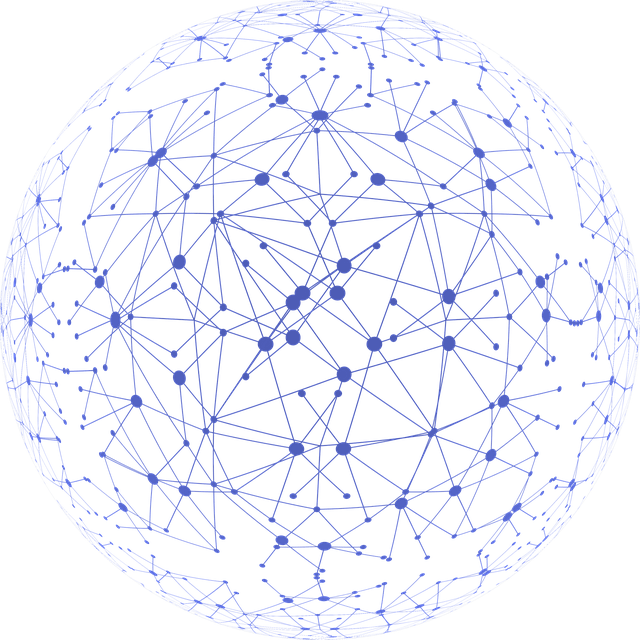
Commercial Application of 5G: Security Uncertainties with 5G Deployment
This Thursday, February 13, 2020 event was presented in partnership with the International Progress Platform and featured leading experts in the fields of 5G and cybersecurity.

Innovation in Brazil
This IISTP Seminar Series event on Monday, February 3, 2020 featured Paulo Zawislak and Otaviano Canuto and was moderated by IISTP Visiting Scholar Nathália Pufal. Missed the event? Watch Innovation in Brazil here.

Humor, Ethics, and Dignity: Being Human in the Age of Artificial Intelligence
This Wednesday, January 29, 2020 event featured Sean Kanuck and was presented in partnership with the Leadership, Ethics, and Practice Initiative.

The Economics of Nuclear Fuel Storage
This Nuclear Policy Talks event, which took place on Thursday, November 14, 2019, featured Sharon Squassoni and the Economist Dr. Geoffrey Rothwell. Missed the event? Watch the Economics of Nuclear Fuel Storage online.
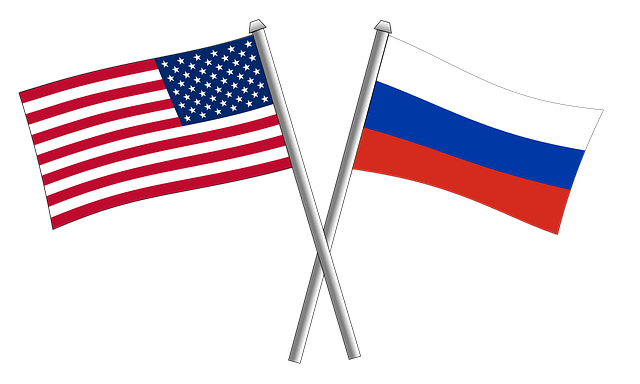
The Future of US-Russian Nonporliferation Cooperation
This Nuclear Policy Talks event took place on Thursday, October 31, 2019 and featured Research Professor Sharon Squassoni and Dr. Vladimir Orlov of the PIR Center.

Reducing Risks of Plutonium Stockpiles
This Nuclear Policy Talks event on Friday, January 17, 2020 featured Sharon Squassoni and keynote speaker Dr. Jorshan Choi. If you missed the event and want to catch up, you can watch Reducing Risks of Plutonium Stockpiles online.
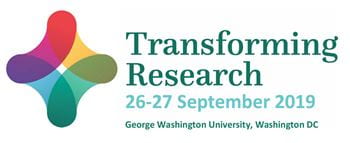
Transforming Research 2019
This IISTP Seminar Series event, featured international experts from wide-ranging disciplines discussing the future of research practice and policy. If you missed any of the action, you can watch Transforming Research 2019 online anytime.
Event Series
Event Gallery
